4 modules
Product Management Fundamentals:
Business, Technology and Psychology
Course Overview
Do you know that most startups or innovation projects fail not for a lack of great ideas, but for bad execution in bringing their ideas to life? This course prepares you for the real journey of taking a technology-based product idea into a successful reality that becomes a part of people’s lives.
This course is about bringing up a new technology-based product, launching it into the market, steering it toward success, and managing it effectively throughout its life cycle.
You will learn to become a great product leader (a.k.a., product manager), a role that is a reincarnation of the spirit of the entrepreneur in the more structured form that can collaborate at scale in large organizations. The role was recently popularized by The Big Tech, as well as the companies where technology is the driver — as opposed to a support function — of the businesses, thereby enabling such companies to overcome traditional barriers, attain agility, scale, and drive transformation in their industries. The role of a product manager is strategic in nature, whereas closely related roles such as product owner and technology project manager are more tactical. As such, Product Strategy is the primary pillar of this course. But there is more to product management than just strategy. A product manager is the CEO of the product, with the ultimate responsibility for the success of the product. Driving toward that success entails strategizing, managing the design and development, managing related operations, launching/shipping, and marketing of it throughout the product’s life cycle.
As a discipline, Product Management represents the state of the art of the efforts to reorient the organizations from function-based (silos) toward empowerment-based (squads), with decision-making power decentralized to the level where the business actually exchanges the most basic units of value with its customers. That basic unit, with which a business exchanges value with customers, is the product or service. Designed to arm a company to adapt nimbly against the backdrop of constant disruption, product management integrates the essence of innovation and execution into a coherent practice. It is something that all thriving startups have learned to do well, and which has become best practice in the modern corporate world where innovation and agility are table stakes. Product Management encompasses both strategy and operations, as well as spanning from leadership to technicalities for a single product vertical. As such it is also a great focal point through which to understand how modern tech-based businesses work.
Whether you’re a startup founder, a corporate intrapreneur, or a technology project manager, the skills you will learn in this course will equip you to innovate more fiercely, execute more productively, and collaborate more effectively to make a real impact to the world through tech-based products and services that not only deliver real benefits but also win the hearts and minds of users.
As a user, the products you have chosen to be a part of your life tells quite a story about who you are. As a product manager, the product you ultimately ship sums up the myriad decisions you have made to shape it and add it to someone’s life. If you want to know the joy of having your product make people’s lives better, this course is for you.
At the end of the course, participants will know:
- What makes a great product, anatomy of a product, product-market fit, and how to achieve it
- The evolving role and responsibility of a product manager, including the latest role as a Behavioural Scientist
- The patterns and dynamics of product development and go-to-market management in entrepreneurial and competitive environments
- Product strategy: crafting product vision, differentiation, strategic management framework, and roadmaps for various stakeholders
- Measuring success for your product with relevant metrics
- Prototyping and agile experimentation for product features
- Prioritization, carving out feature sets, and determining MVP
- How to create culture and rhythm for collaboration across the organization with agile dynamics and processes
- Technology architecture fundamentals
- Managing at the tactical levels with backlog, burndown chart, and other facilitating artifacts
- Elements of product marketing, including launch strategies, growth strategies, and extension strategies
Lead Instructors

Choedpong "O"
Khannabha
Managing Director at Frontier Innovation Co. Ltd., Former Product Director at Kaidee
O was a Program Manager at Microsoft in Redmond, WA, USA; a Product Director at Kaidee.com, Bangkok, Thailand; and a tech startup entrepreneur at Phuket Application Co. Ltd., Phuket, Thailand.
With a background in software engineering, O has worked as a full-stack software engineer at a venture-funded US-based startup, before stepping into a career in product management. The journey has been that of both professional and personal growth. He applies, for example, roadmapping not only for the products he manages but also for his life. While O grounds himself in the science in product management, he believes it is also an art, emphasizing as equally important the softer sides: design, psychology, and leadership.
Creating a new product and bringing it to market may sound like business as usual to some, but O believes that it is also an act of evolutionary significance, as it literally advances our civilization by a step, however big or small that may be. Humans have always lived in the world of the products we created — a hunting spear, a skyscraper, an iPhone; in fact, these products also shape the world we see and experience. O’s first realization of this was when he was a boy on his dentist’s reclined chair, where he could not help but ask himself how painful it would have been without the right tools in the right place at the right time. It is with this perspective, along with many other lenses, that O creates this course in product management so that we can make one another’s lives better through great products, particularly technology-based product.
O is passionate about innovation, technology, and strategy. He is a former analyst for McKinsey & Company, a software engineer named inventor on a U.S. patent, and a graduate of the Stanford D.School. His sweet spots lie in the intersection between technology and humanity and include user experience, futures thinking, computing, psychology, and system design.
Since his last startup, O has been helping global companies as well as startups strategize, design, and build technology-based products, scale them, as well as coaching their product teams. O studied Computer Science at Grinnell College, IA, USA; and Management Science & Engineering at Stanford University, CA, USA.
Guest Speakers
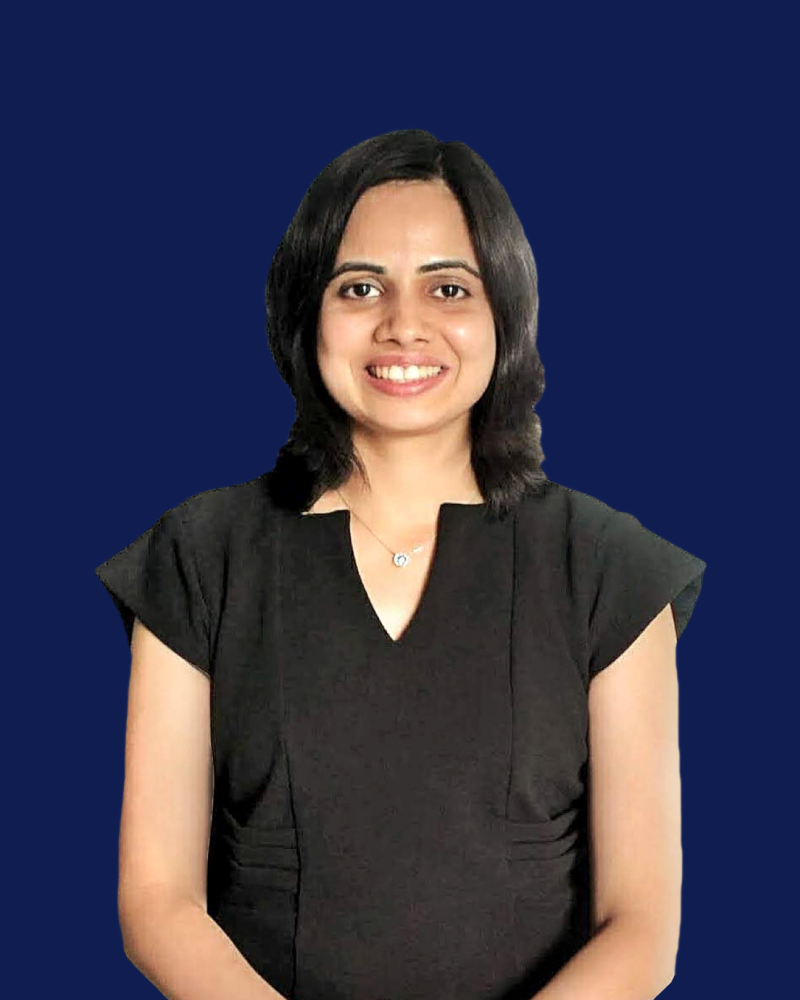
Preeti
Kotamarthi
Behavioural Science Lead at Grab
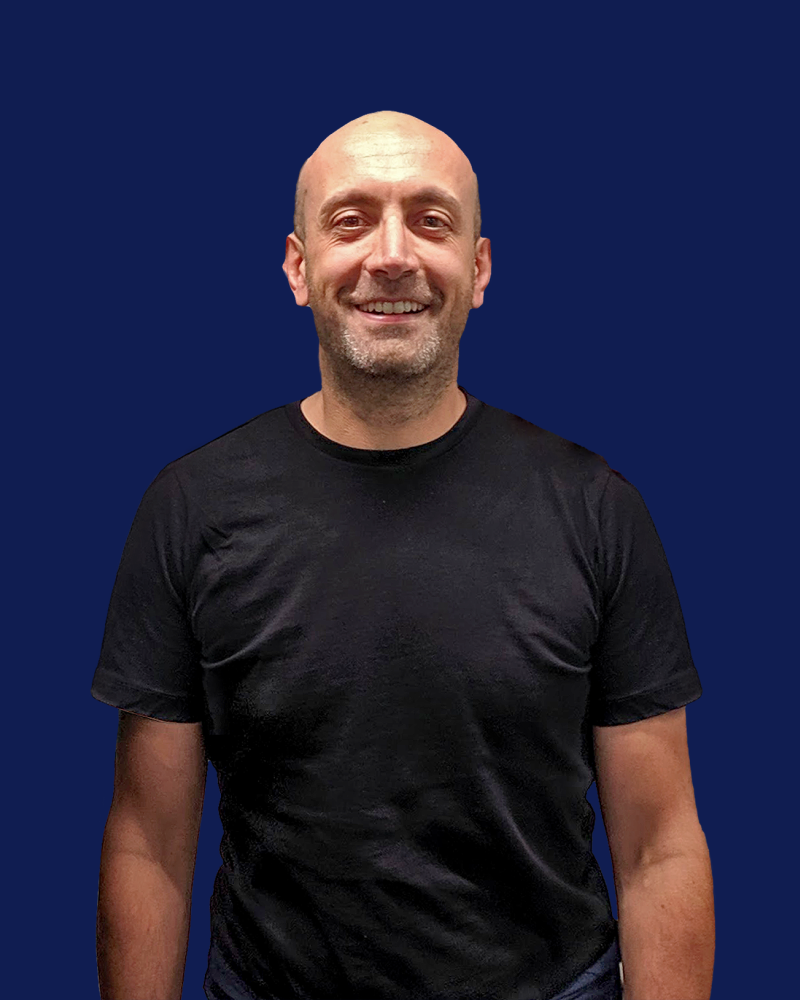
Alfonso
Fiore
Head of Product - Travel Packages at AirAsia

Nitcharee
Nitinavakorn
Senior Product Owner at Revolut

Nat
Wongtosrad
Lead Product at Yara | Ex-Spotify

Torsak
Chaiwattanaphong
CTO, JIB Digital Consult, former CTO and Co-Founder at TQLD Co., Ltd.

Paruey
Anadirekkul
Product Owner at SCB10X








Who should attend
Corporate intrapreneurs
aspiring to build promising ideas into commercial product successfully
Software developers and engineers
wanting to round out to business and design aspects
IT professionals
seeking to augment project management skills with more business and design aspects
Design professionals
looking to round out to strategy and business aspects
People in junior Product Management roles
aspiring to take on more responsibilities
Executives
seeking understanding about structuring product management practice in their organizations
Why You’ll Love Learning Here
HANDS-ON
Interactive & intimate classes with direct feedback from instructors
REAL CASE STUDIES
Solve real-world problems that are directly applicable to your work
EXPERT INSTRUCTORS
Taught by real professionals in the field & university academics
NETWORKING OPPORTUNITY
Make life-long connections with like-minded professionals
CONVENIENT TIME & PLACE
All workshops are either on weekends evening or weekday in central Bangkok (unless is online)
What our Learners Think
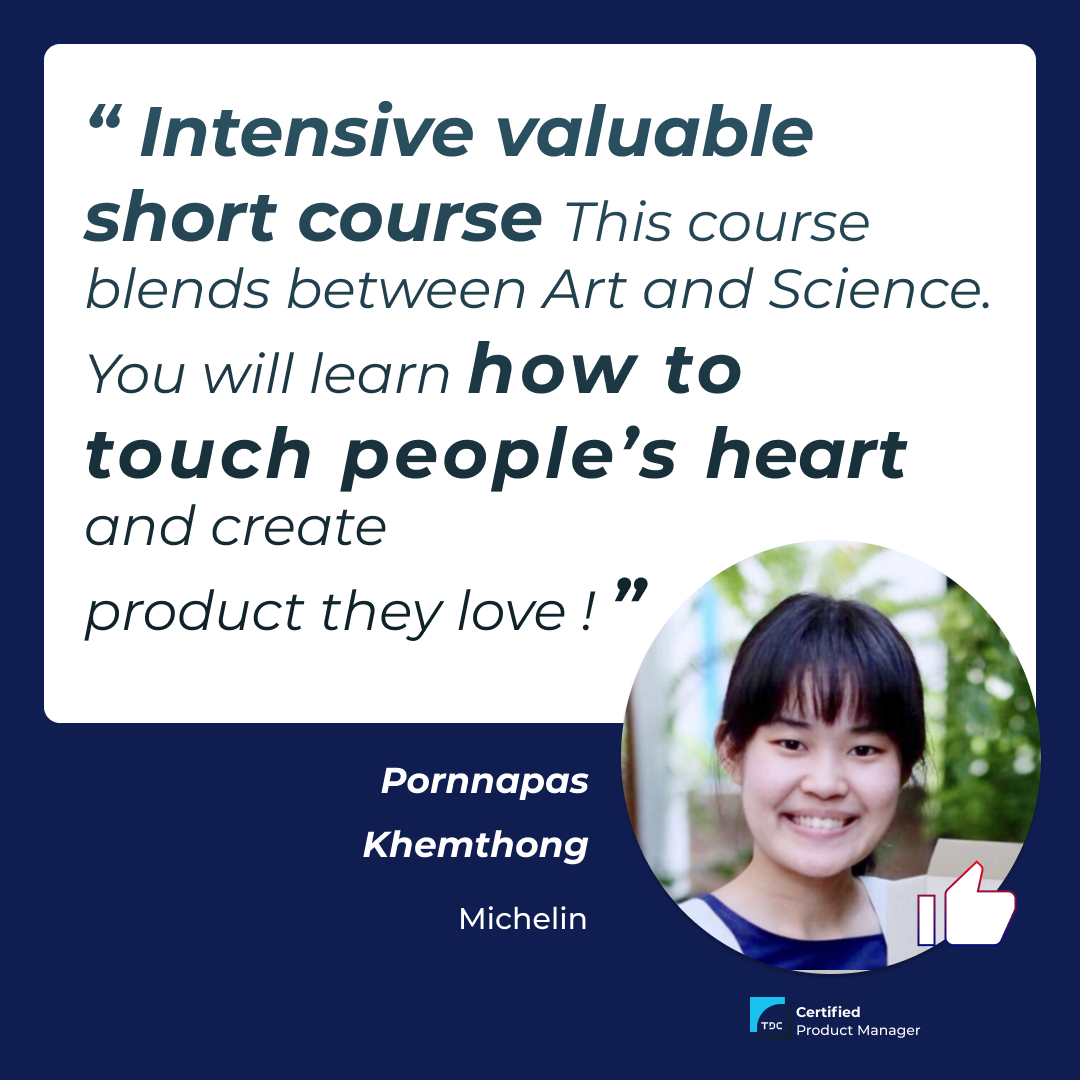
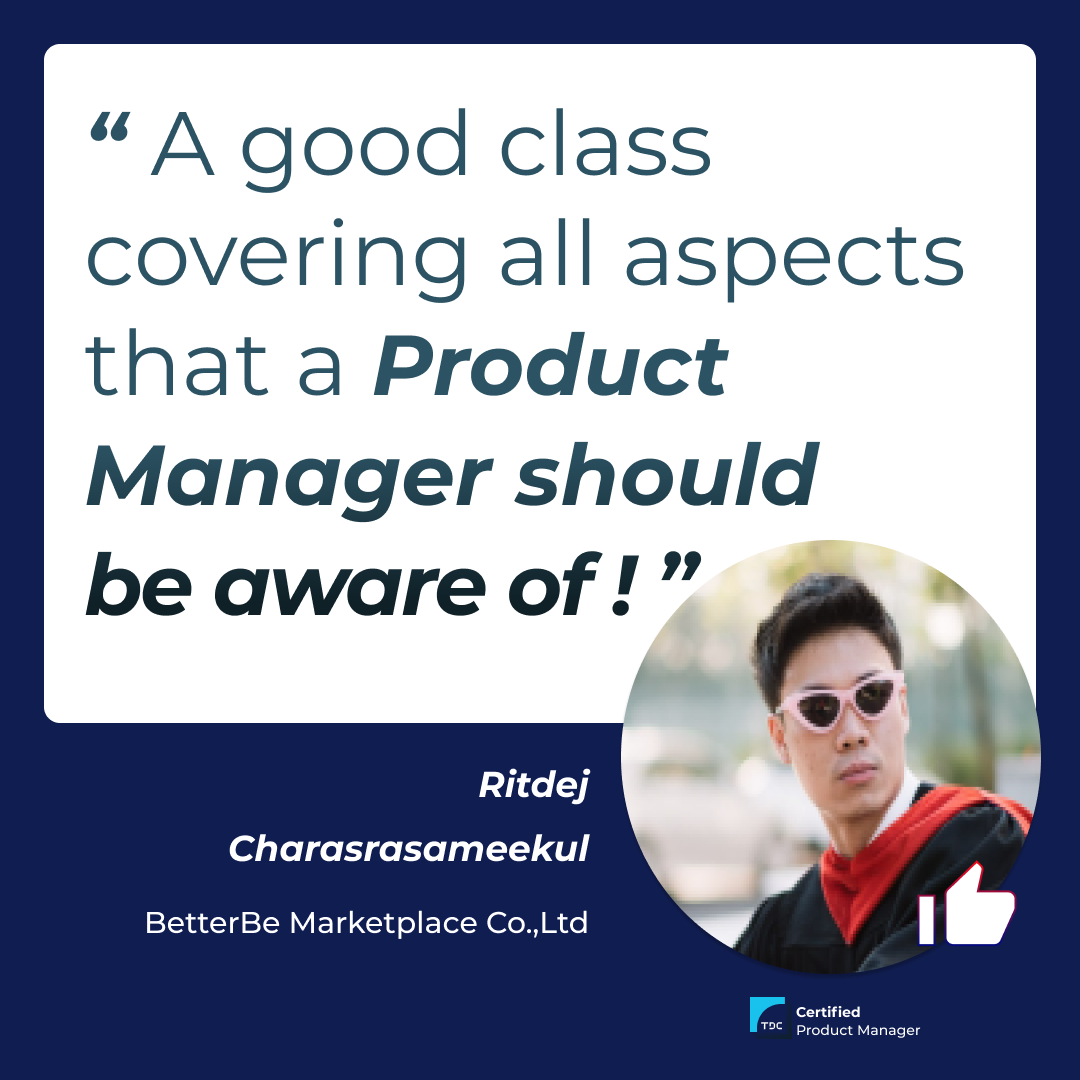
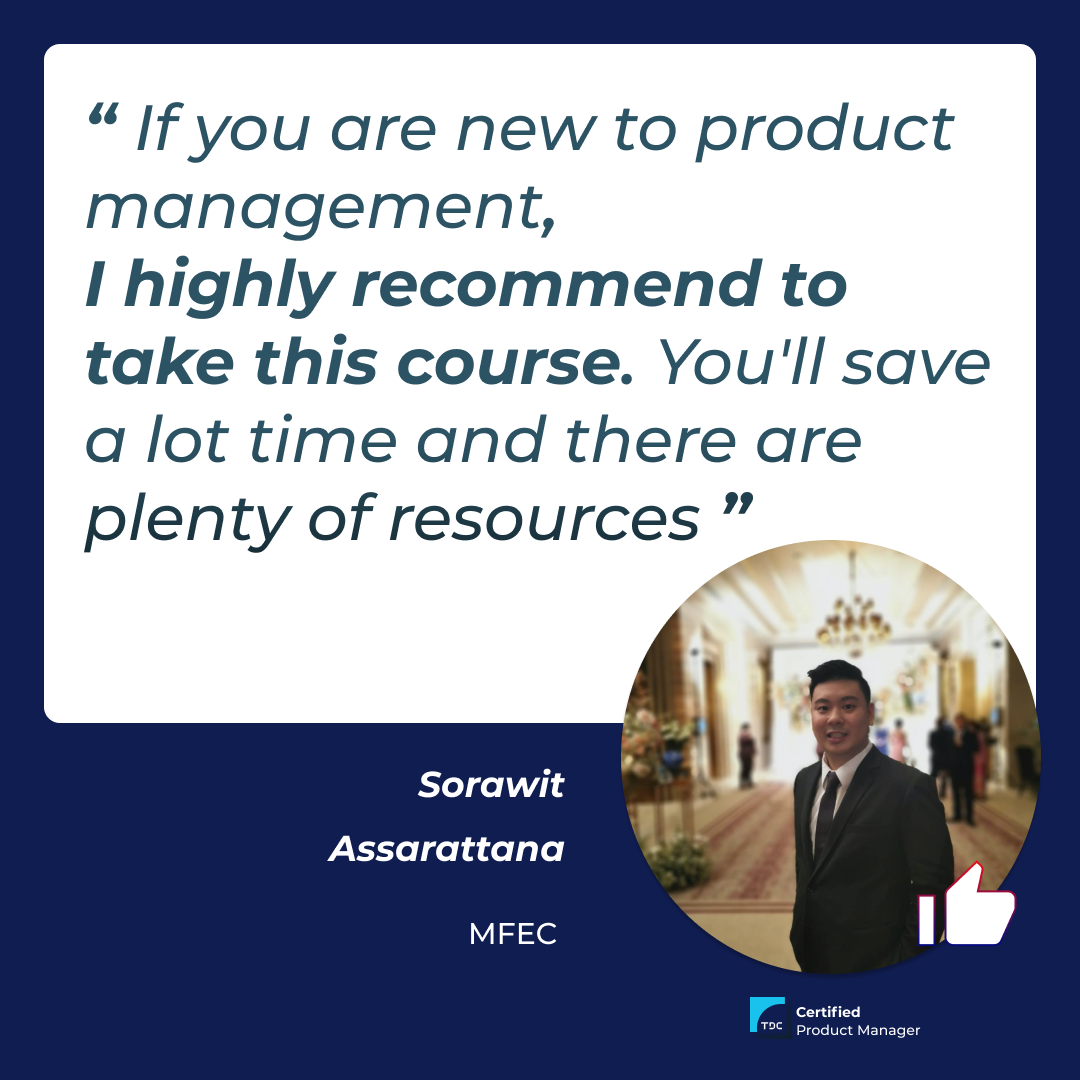
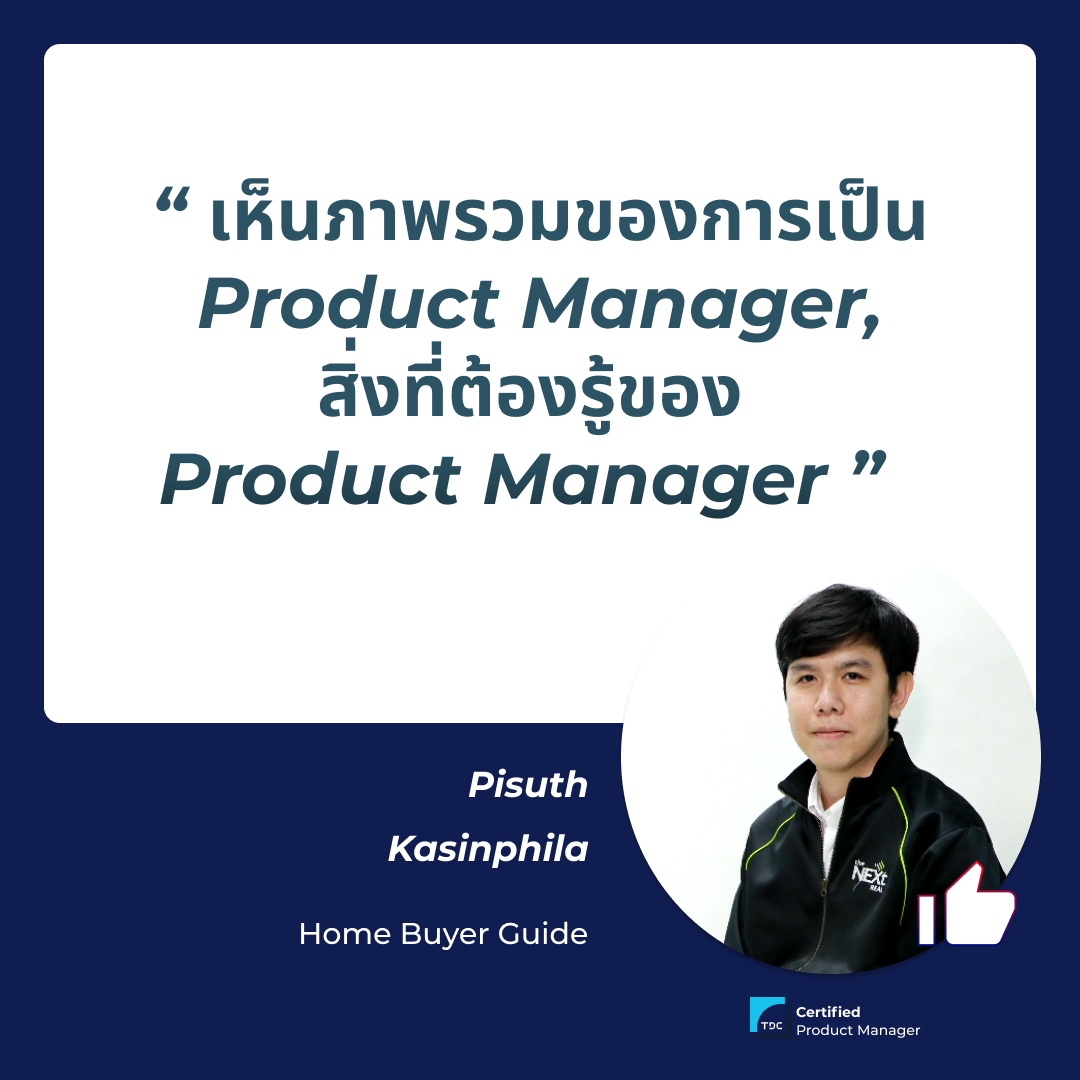
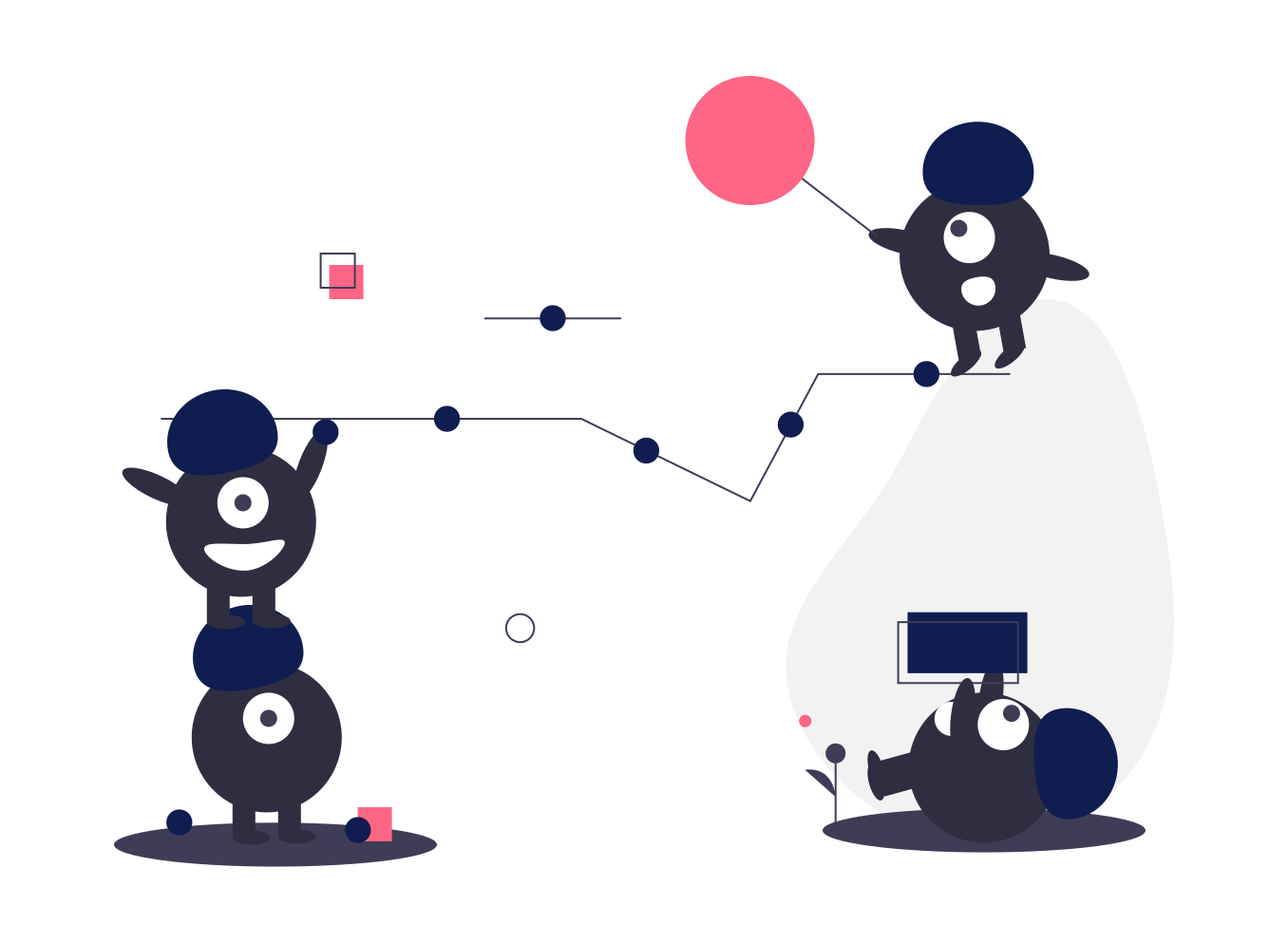
Module 1
Saturday, 13th February 2021 (9:30 - 16:30)
The fun and challenges of managing technology-based product
Learners will discover:
- What makes a great product? — Develop your product sense
- The role of a product manager and the kind you are going to be
- The responsibility of product management
- The generic product life cycle and the corresponding generic strategy
- Patterns in market adoption of technology-based products;
- The dynamics of product development and go-to-market management in entrepreneurial and competitive environments.
Guest speaker's topic
Different roles of PM in startup, growth, and mature organizations
Instructor

Choedpong "O" Khannabha
Managing Director at Frontier Innovation Co. Ltd., Former Product Director at Kaidee

Alfonso Fiore
Head of Products at AirAsia, ex-Grab

Module 2
Saturday, 20th February 2021 (09:30 - 16:30)
Product strategy, product-market fit
Learners will discover:
- Anatomy of a product-market fit, and how to achieve it;
- How to uncover opportunities by understanding users;
- Prototyping: the art and science of agile experimentation
- UX: Usability, Behavioral Design
- The role of Behavioural Science in product management
1 st Guest speaker's topic
Why PM’s should care about why users do what they do? -- Behavioral Science and Product Management
2nd Guest speaker's topic
MVP and Practical A/B Testing in the Real World
Instructor

Choedpong "O" Khannabha
Managing Director at Frontier Innovation Co. Ltd., Former Product Director at Kaidee

Preeti Kotamarthi
Behavioural Science Lead at Grab

Nitcharee Nitinavakorn (Nani)
Senior Product Owner at Revolut

Module 3
Saturday, 27th February 2021 (09:30 - 16:30)
Integrating execution and innovation
Learners will discover:
- Product strategy: the central role of a PM
- How to differentiate your product by first understanding the competitive landscape
- How to craft a product vision, set goals, and measure success — metrics and OKRs
- How to create culture and rhythm for collaboration across the organization with roadmapping?
- How to cut feature sets, and what is MVP?
1st Guest speaker's topic
Organization design for product-led companies
2nd Guest speaker's topic
Real Product Management practices in corporate setting
Instructor

Choedpong "O" Khannabha
Managing Director at Frontier Innovation Co. Ltd., Former Product Director at Kaidee

Nat Wongtosrad
Lead Product at Yara | Ex-Spotify

Paruey Anadirekkul
Product Owner at SCB10X
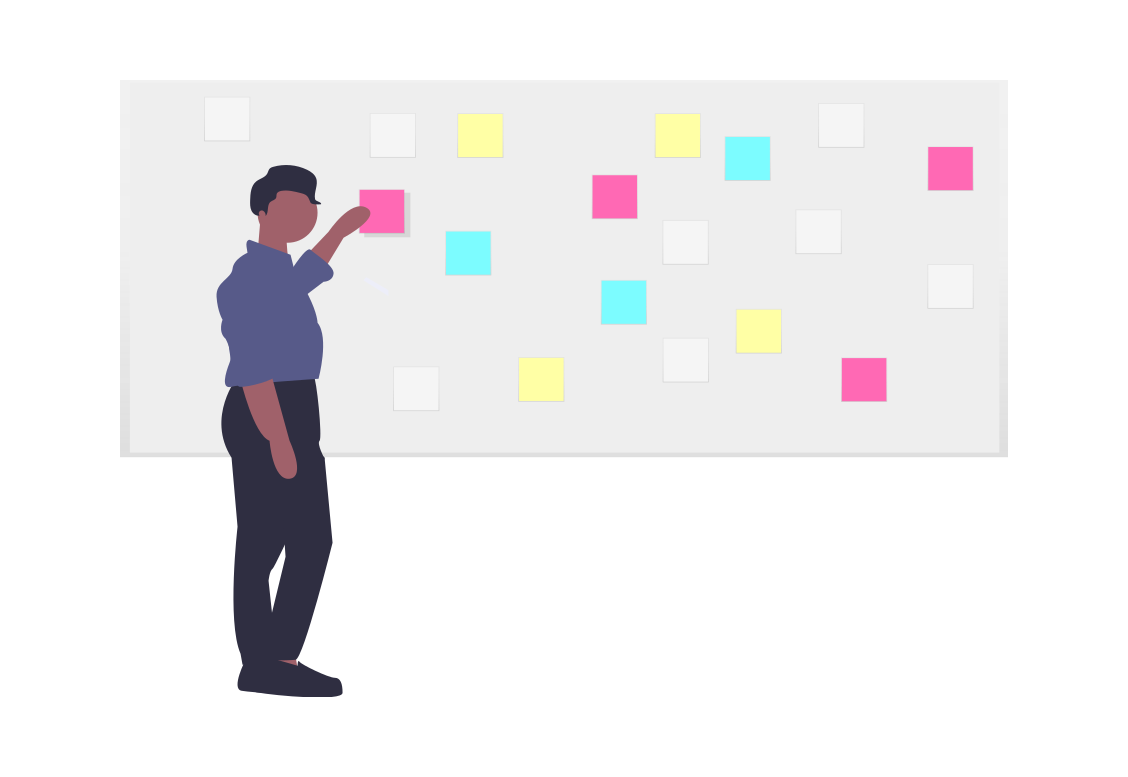
Module 4
Saturday, 6th March 2021 (09:30 - 16:30)
Leading your product team under uncertainties
Learners will discover:
- How to communicate effectively with the tech team
- Process and dynamics in an agile technology team
- What to do when you have more work than resources? — capacity planning, prioritization, backlogging
- Fundamentals of technology architecture
- Product Marketing: how to get users to start and keep using your product?
Guest speaker's topic
Technology architecture and tech team productivity
Instructor

Choedpong "O" Khannabha
Managing Director at Frontier Innovation Co. Ltd., Former Product Director at Kaidee

Torsak Chaiwattanaphong
CTO, JIB Digital Consult, former CTO and Co-Founder at TQLD Co., Ltd.
Putting theory into practice
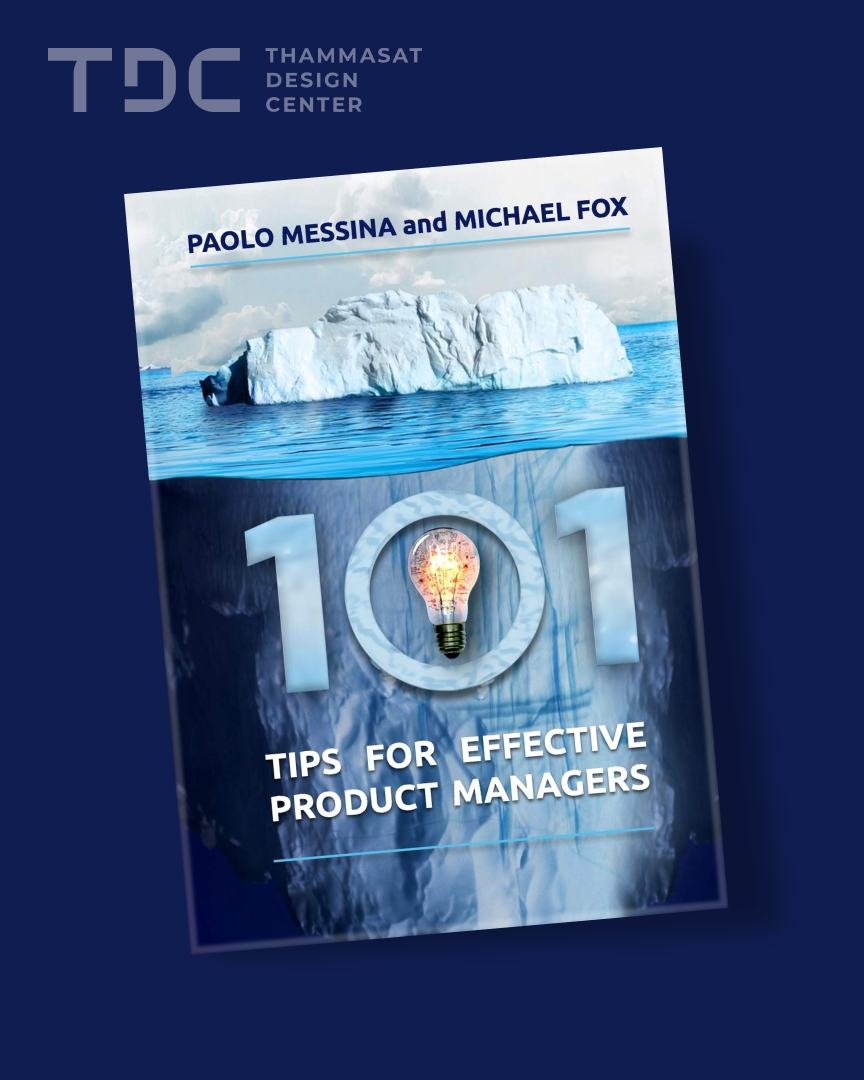
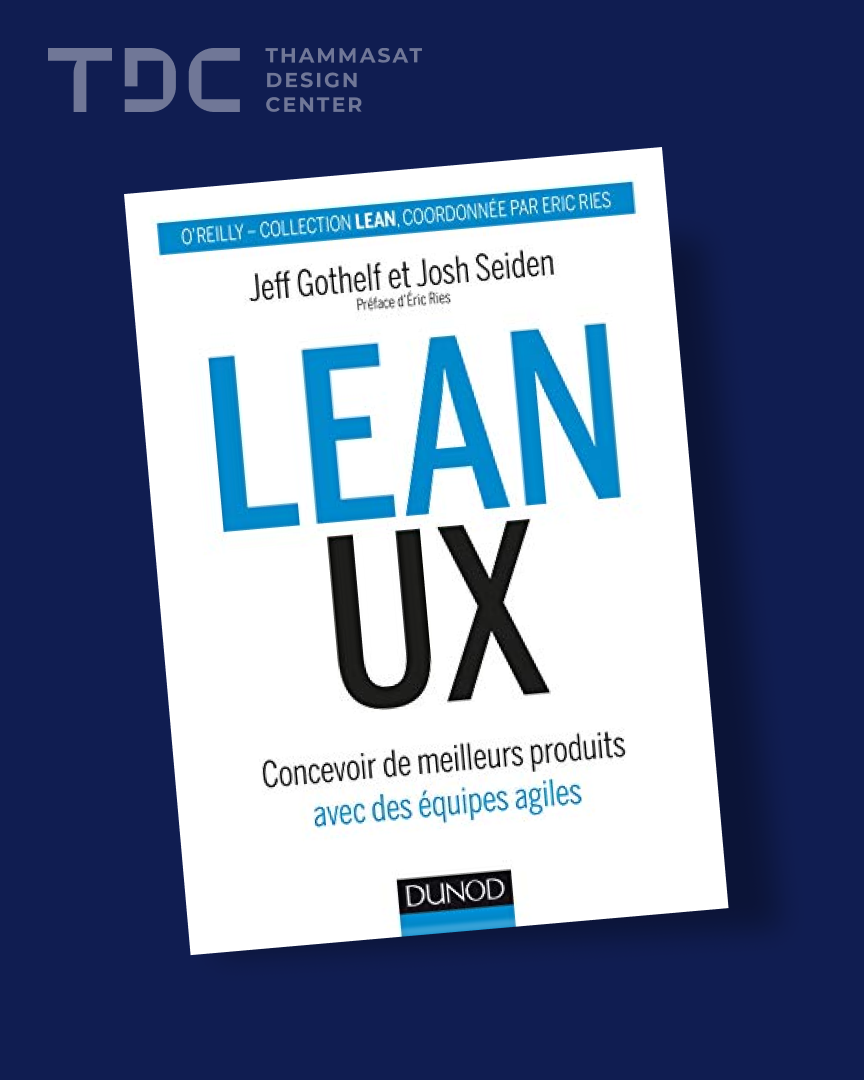
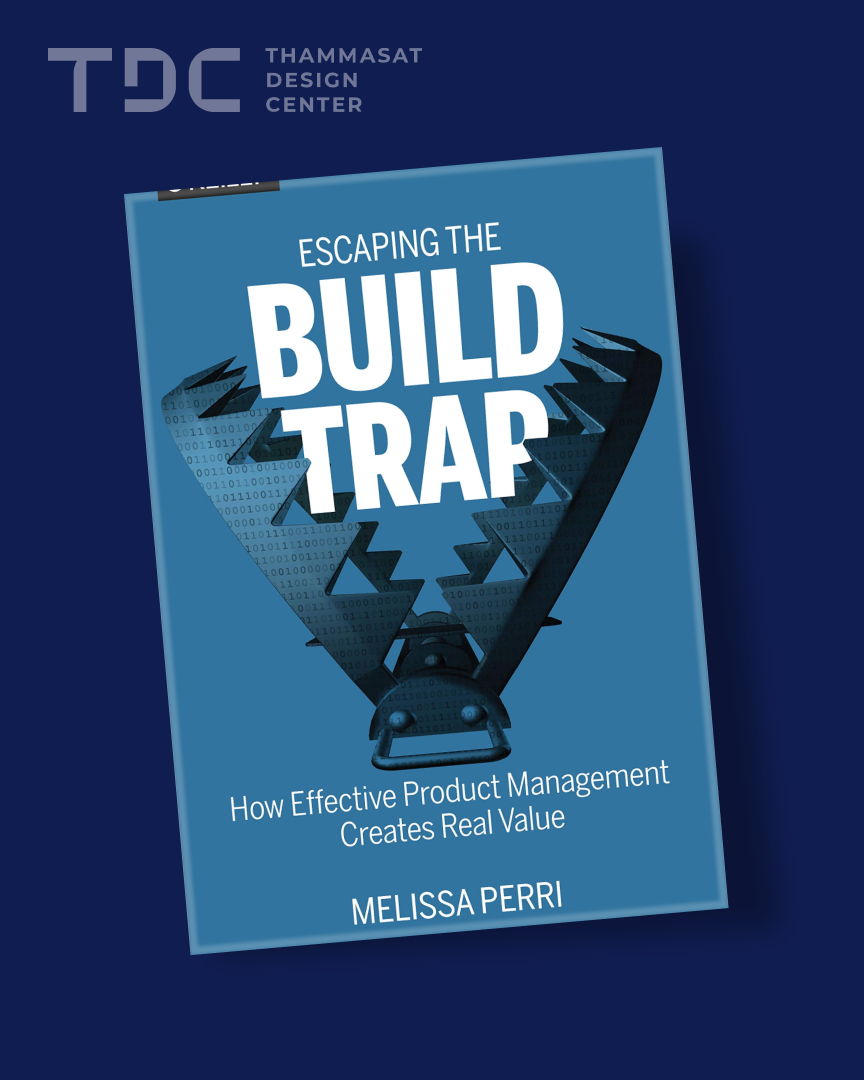
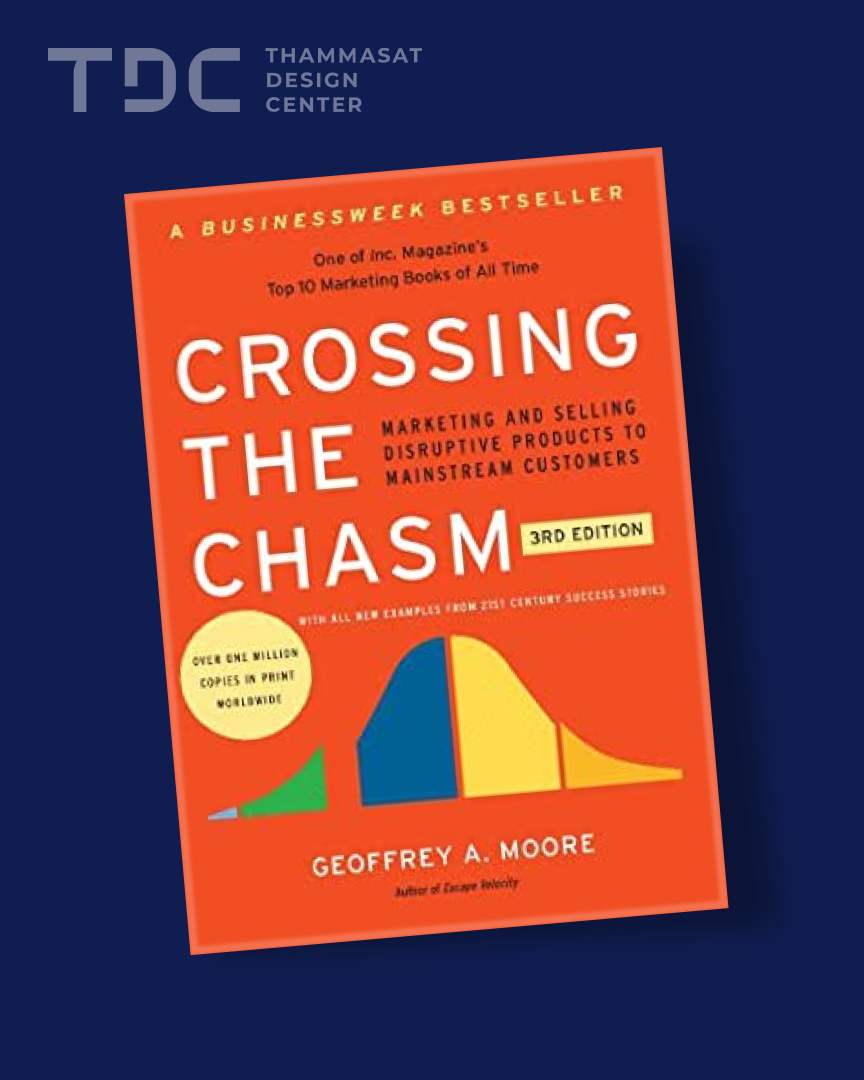
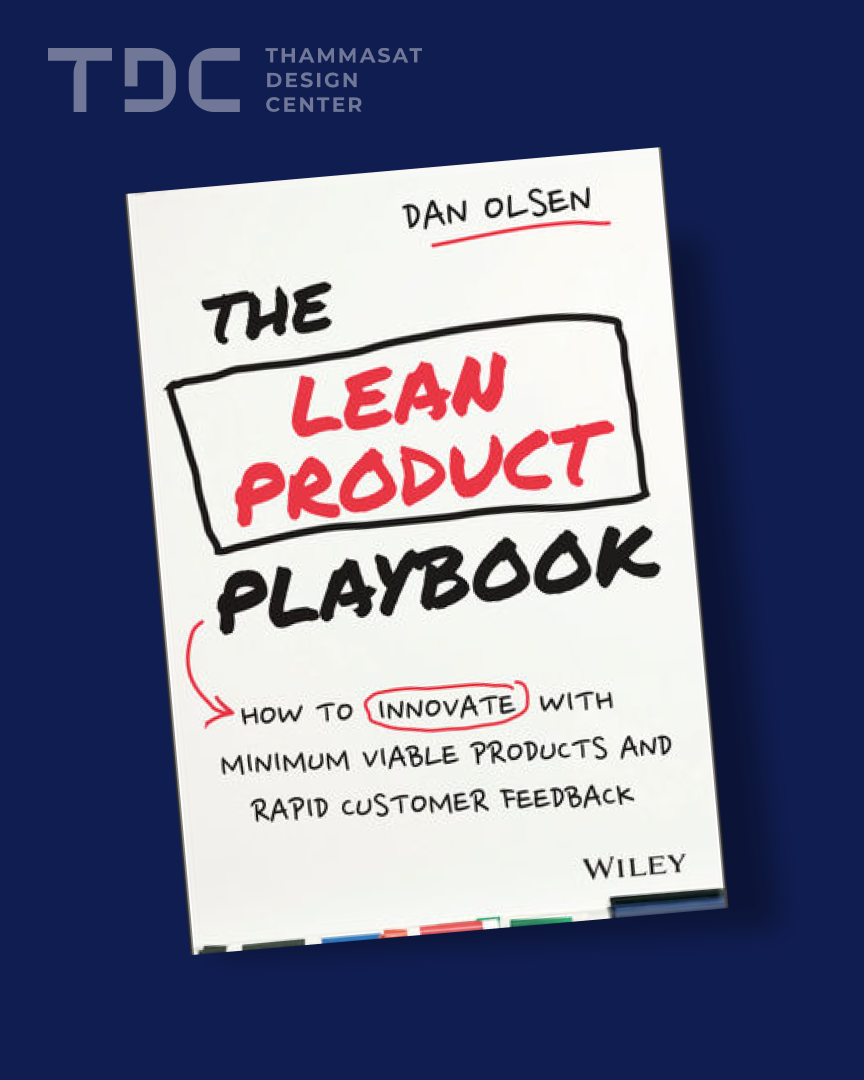
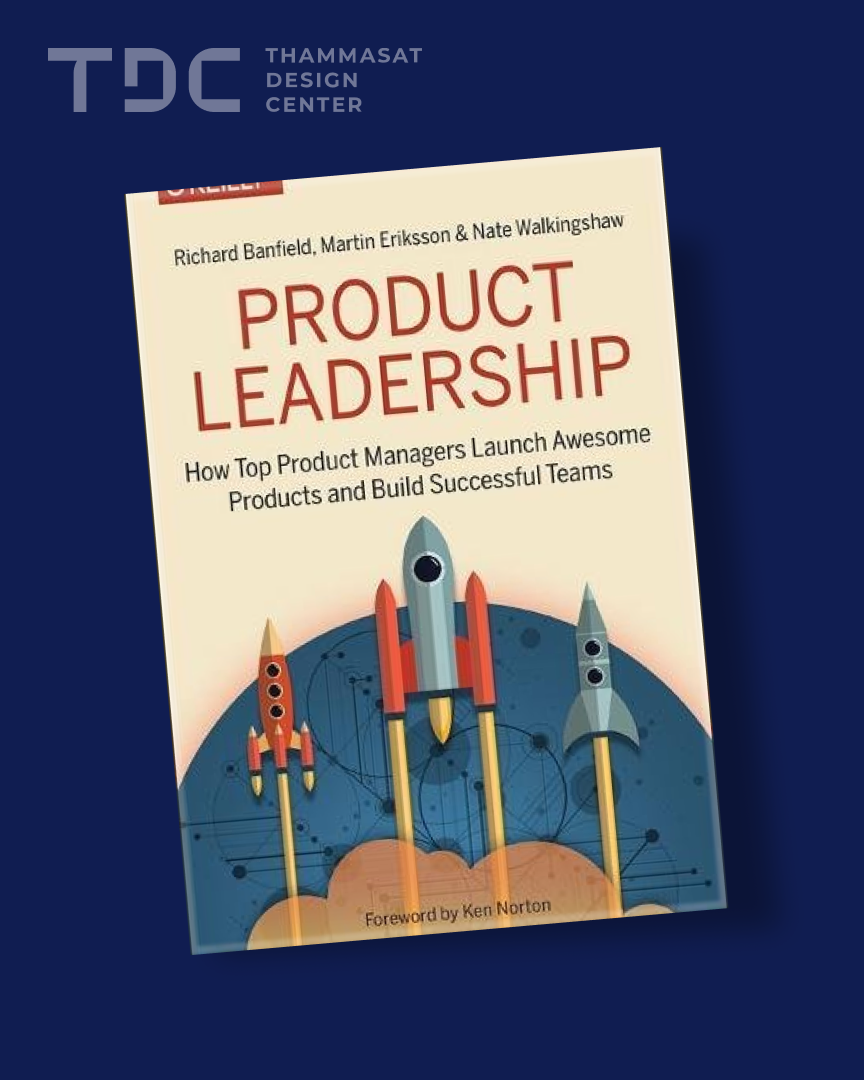
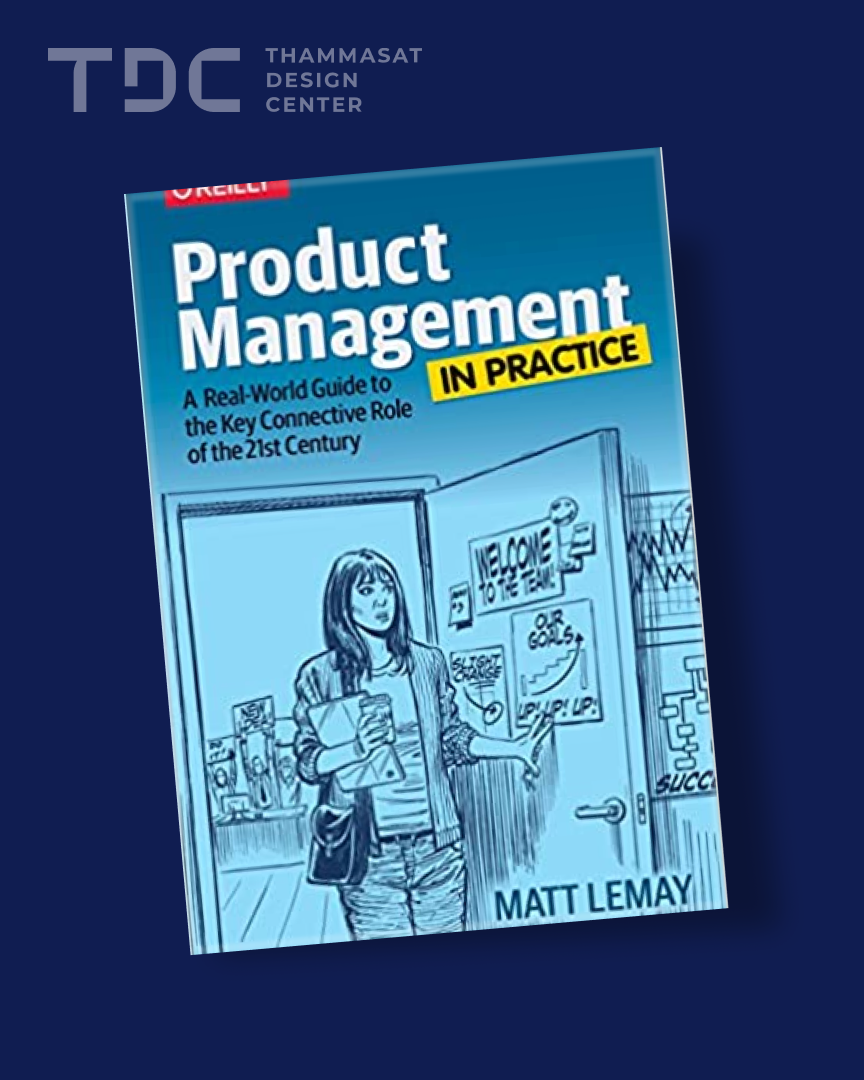
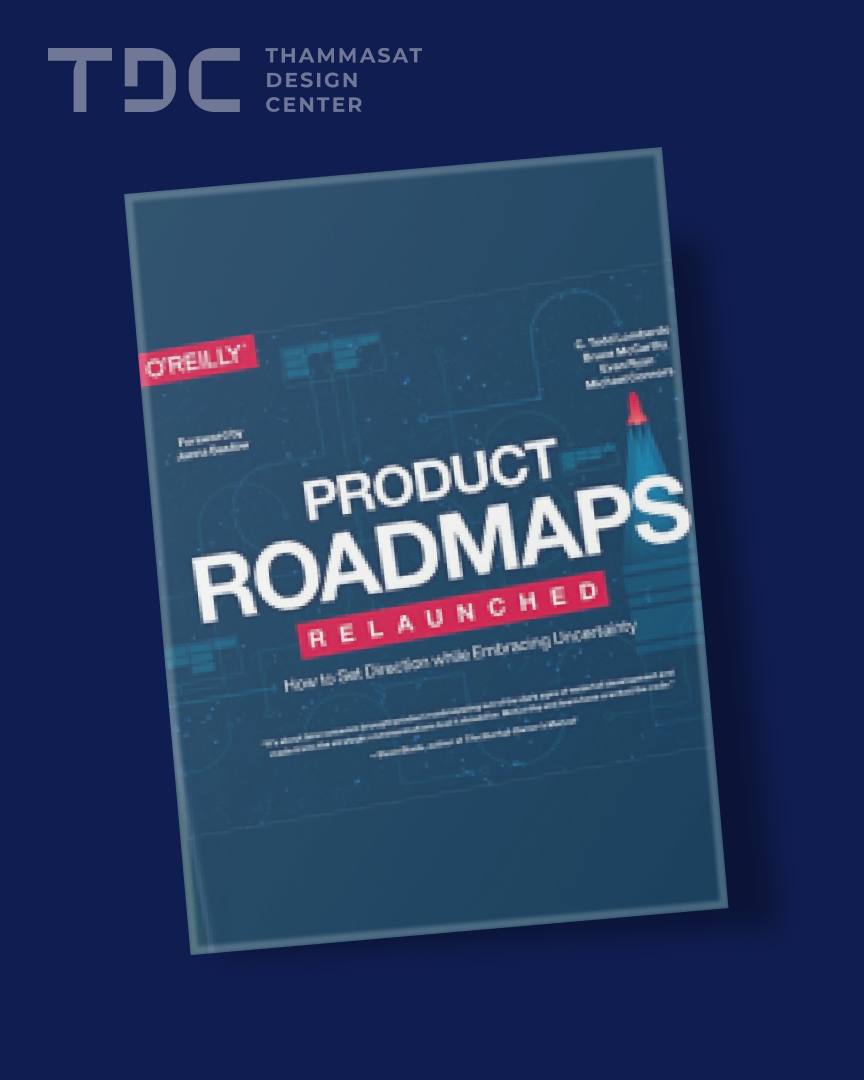
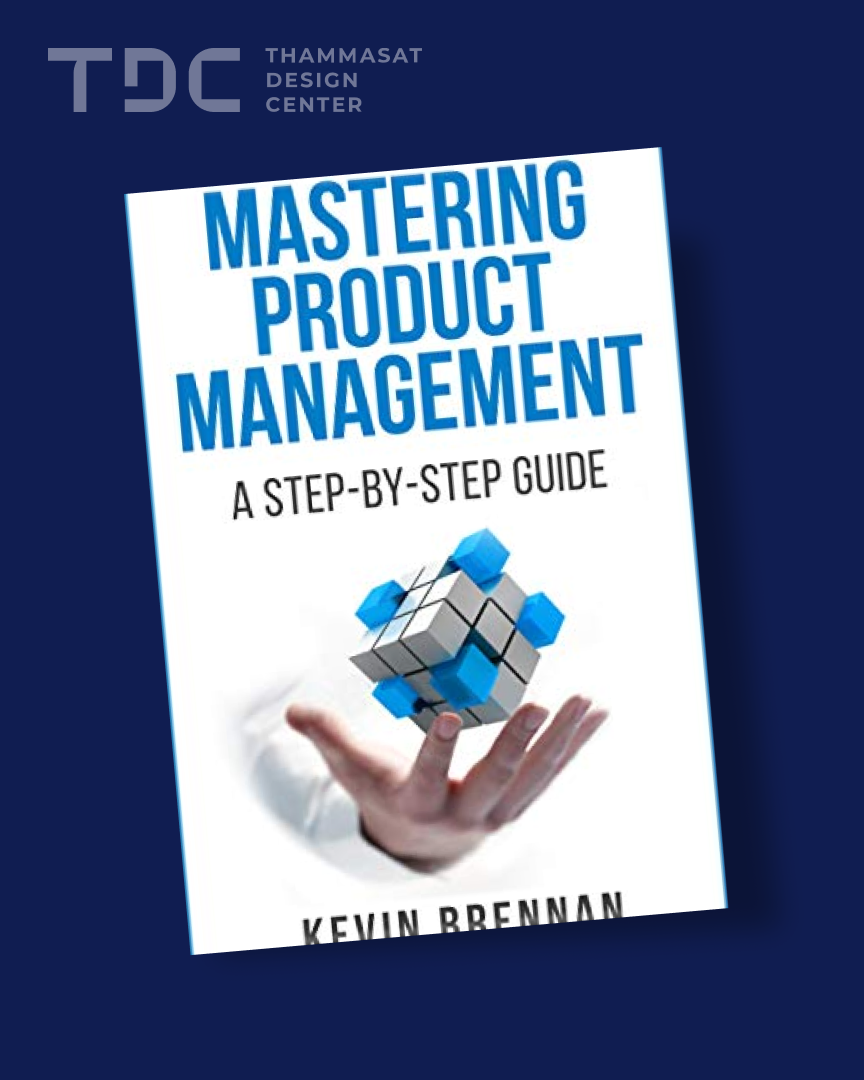

Get Inspired

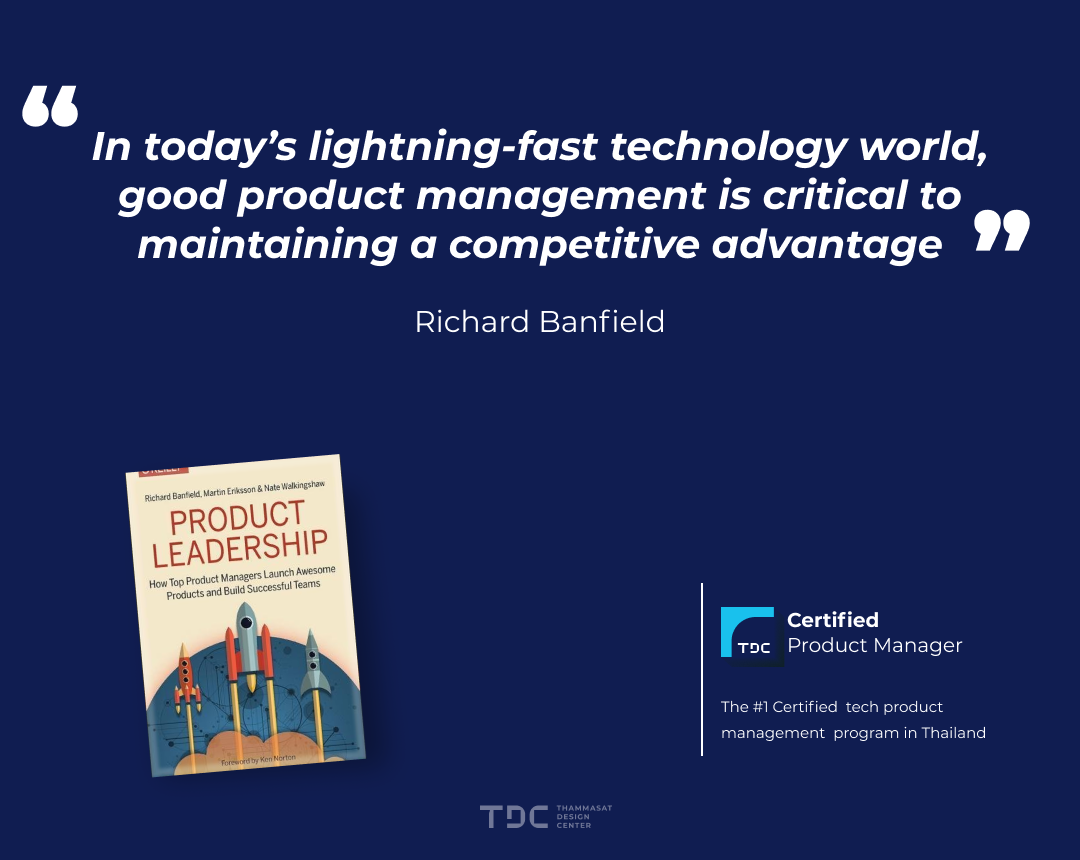
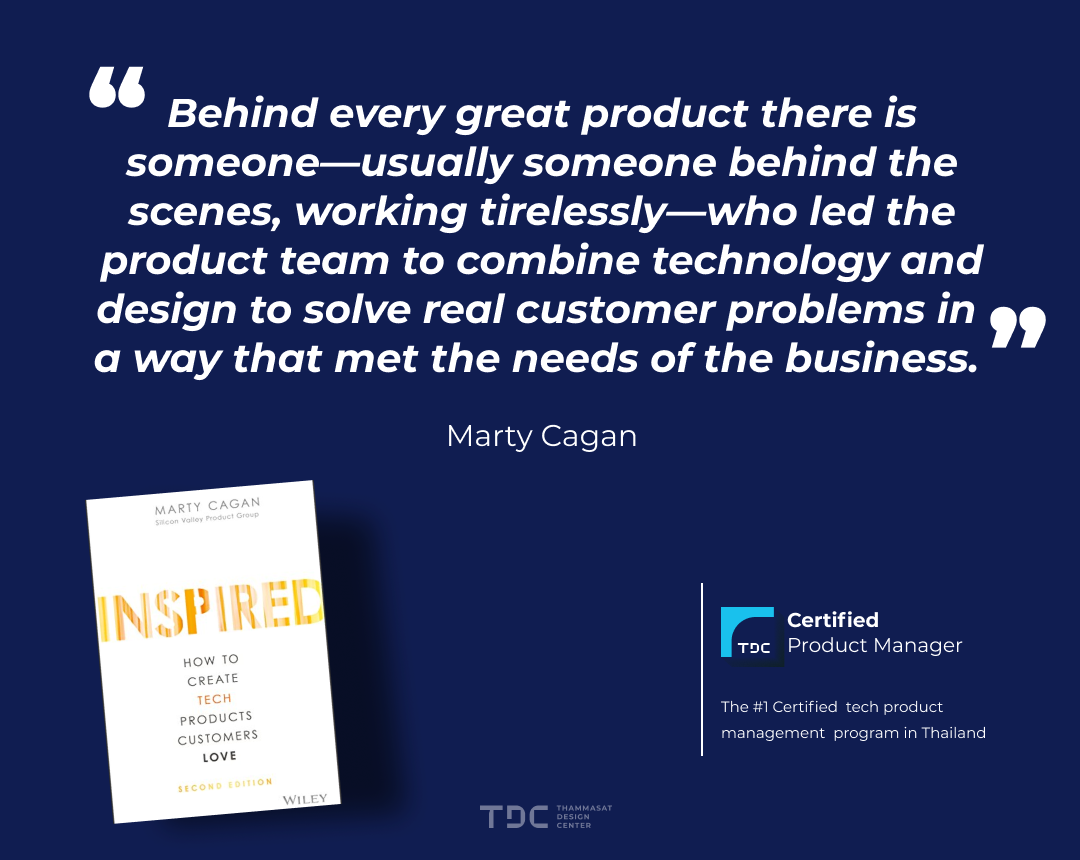
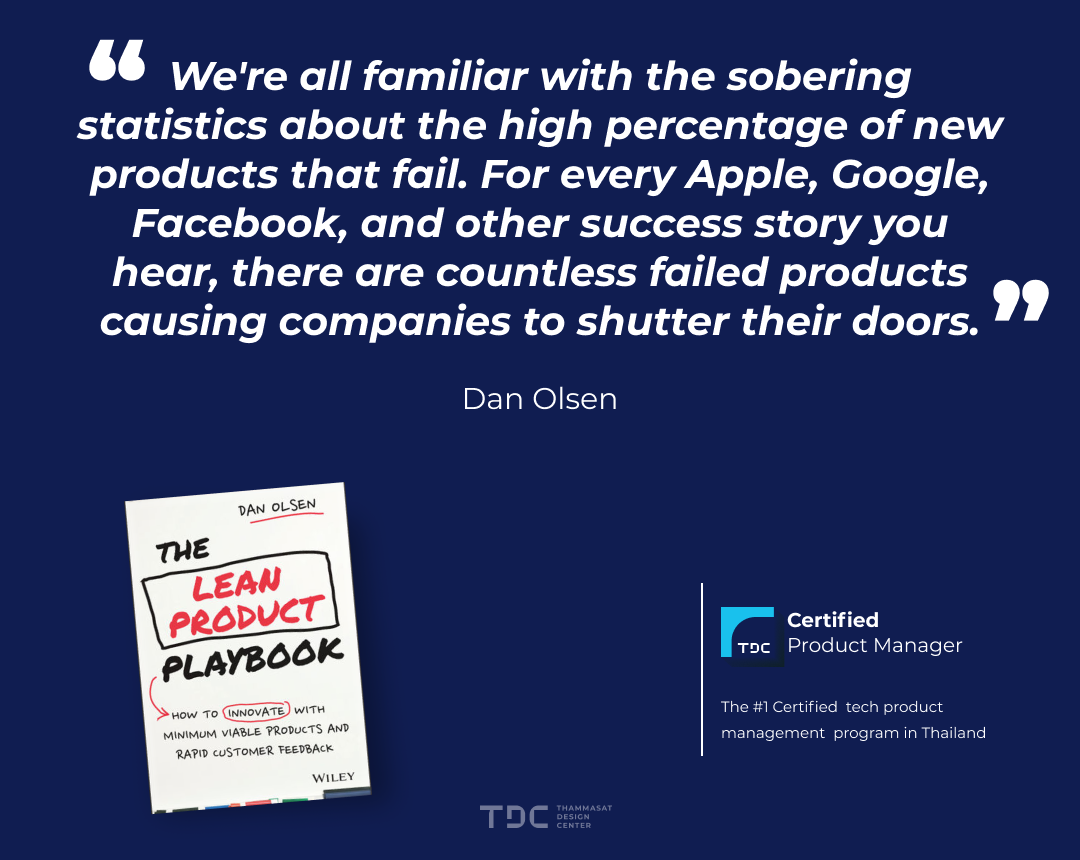
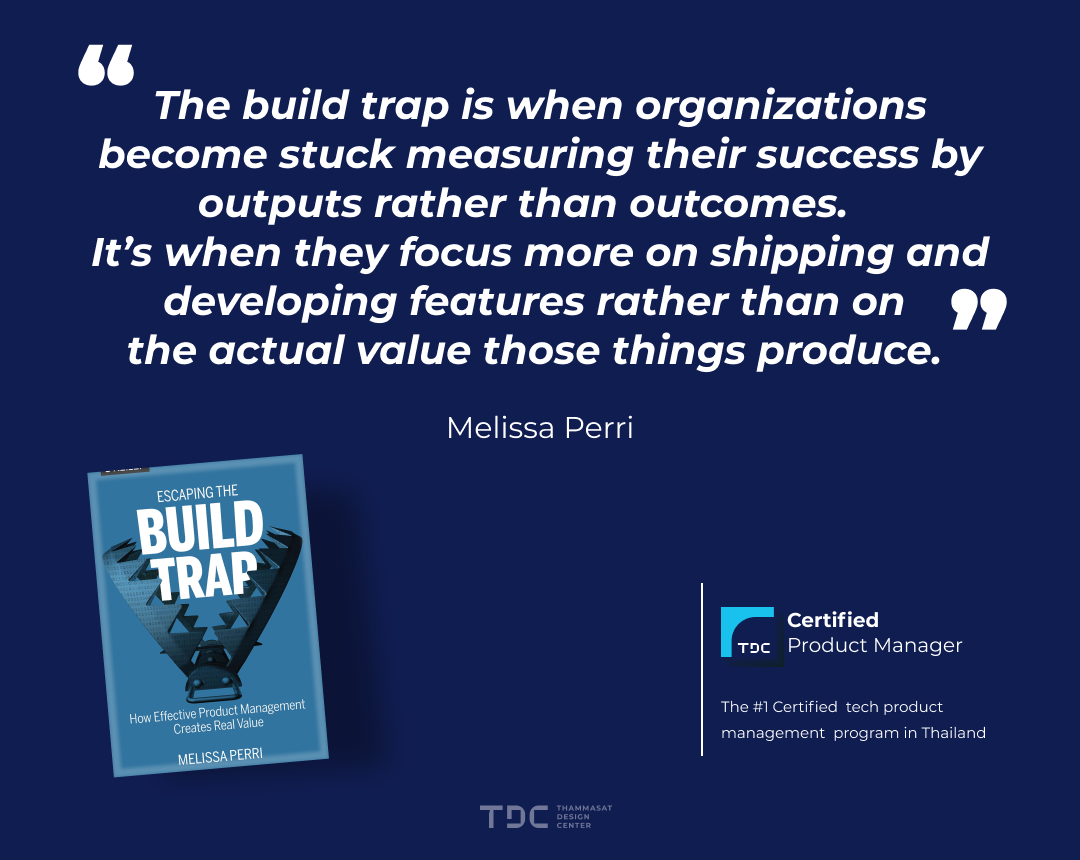
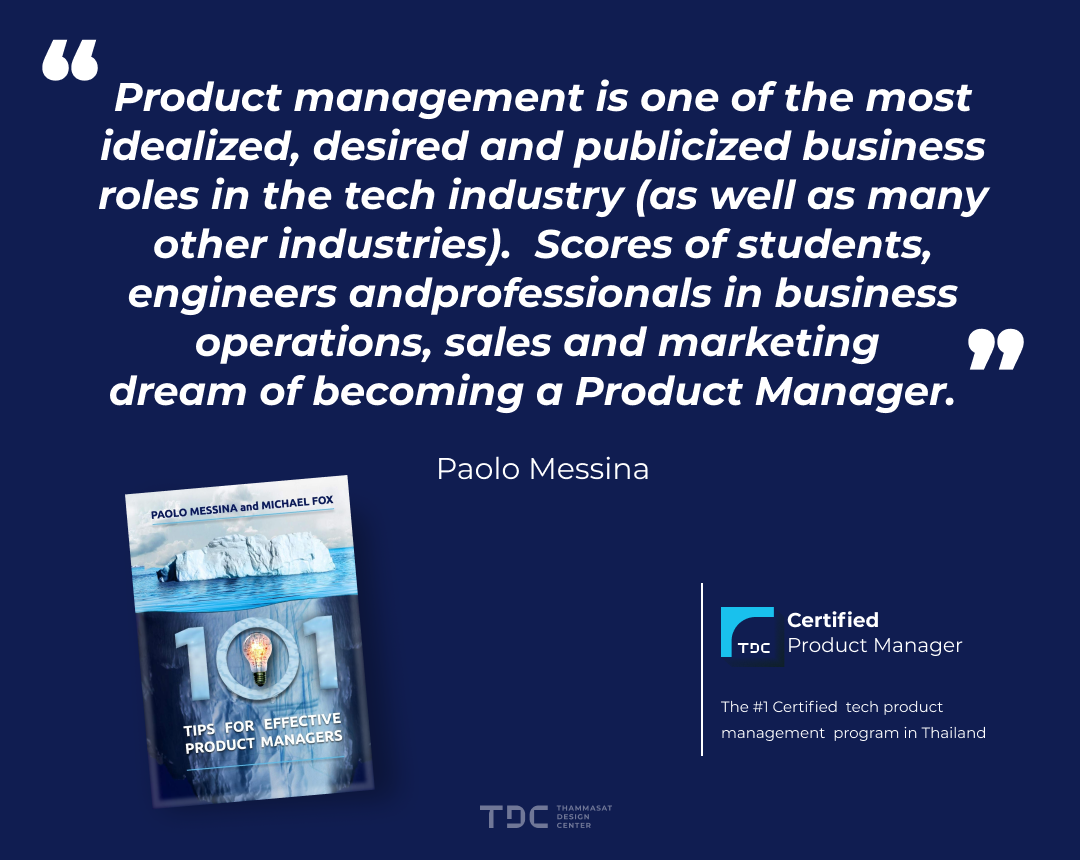
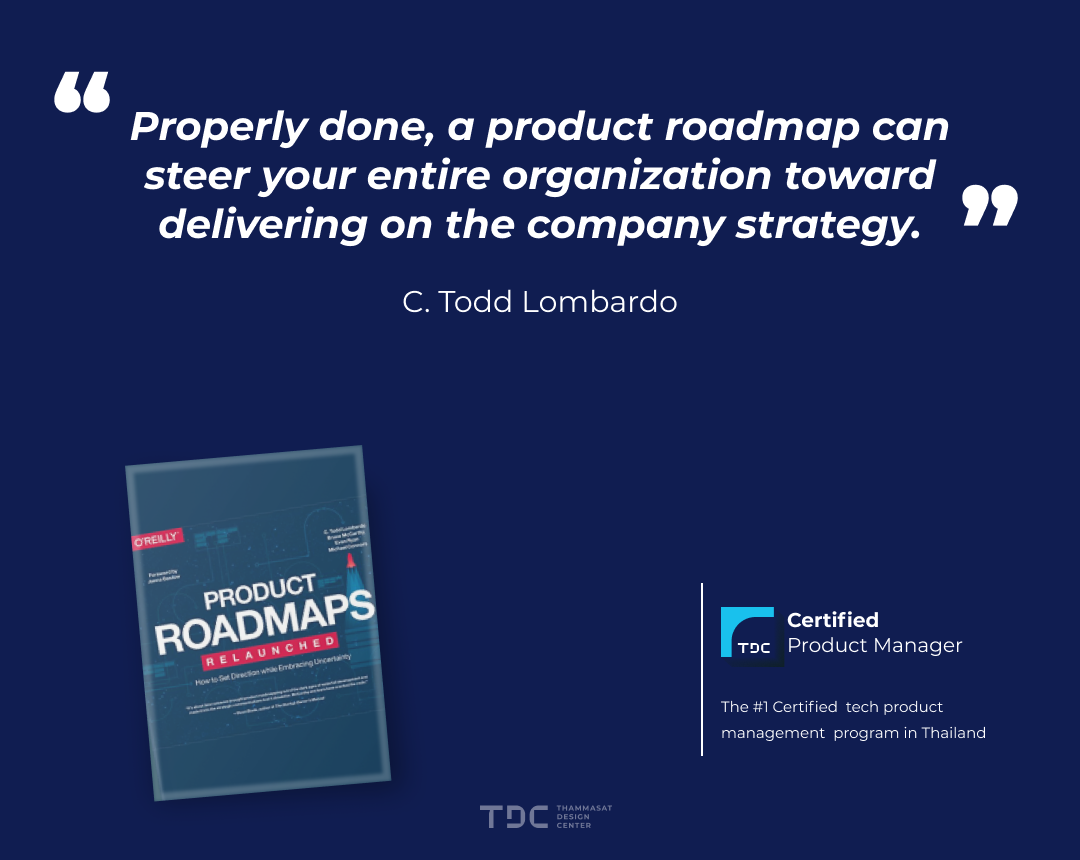
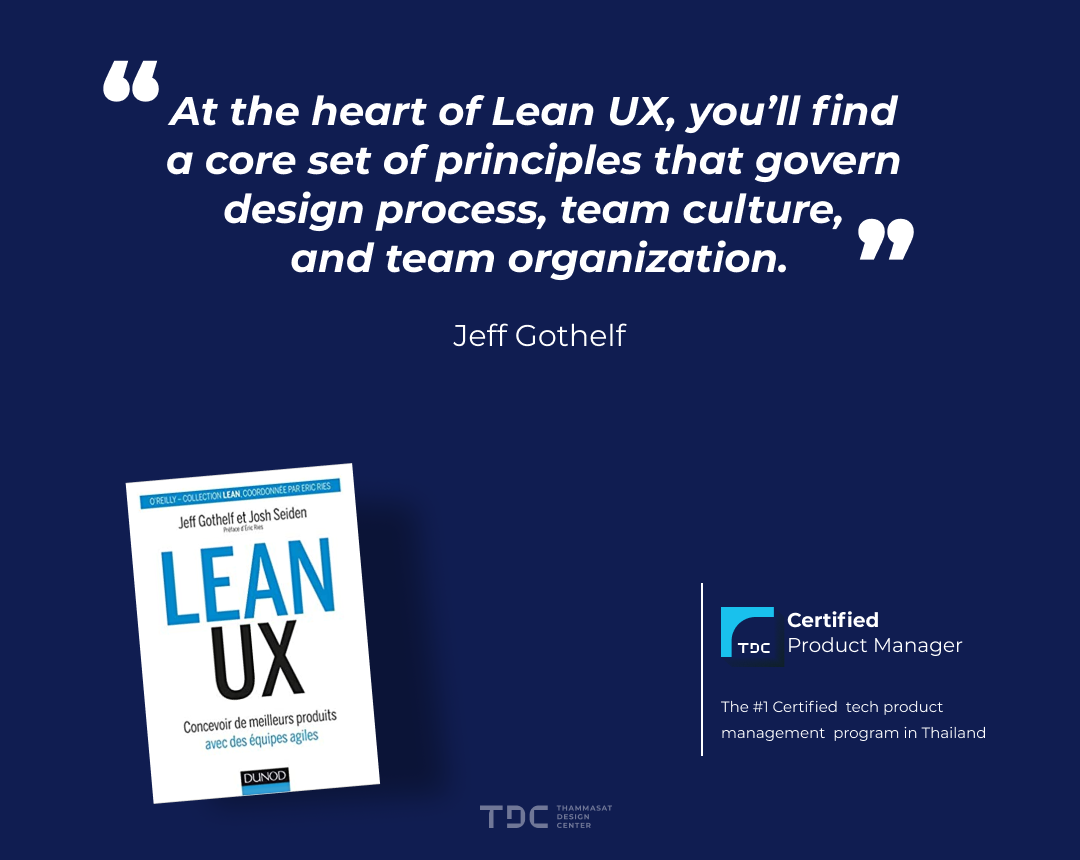
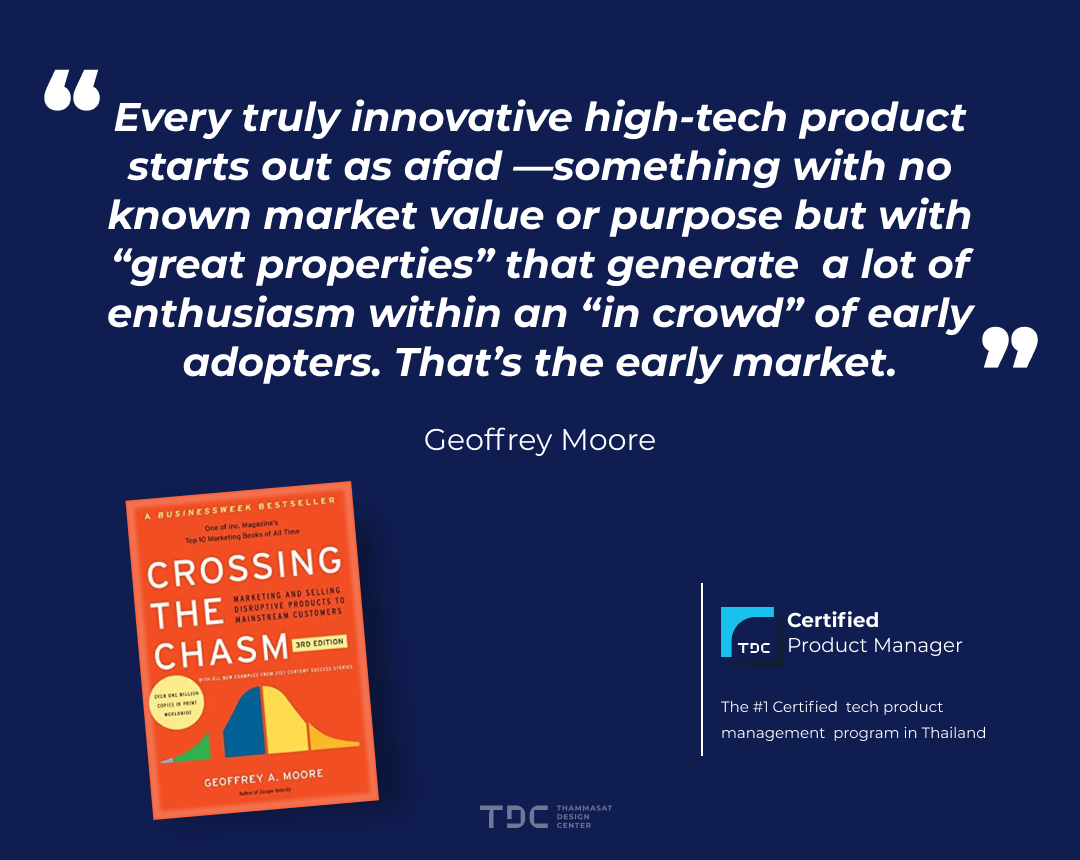
Become a Tech Product Manager

Fully Certified Program by
Thammasat University

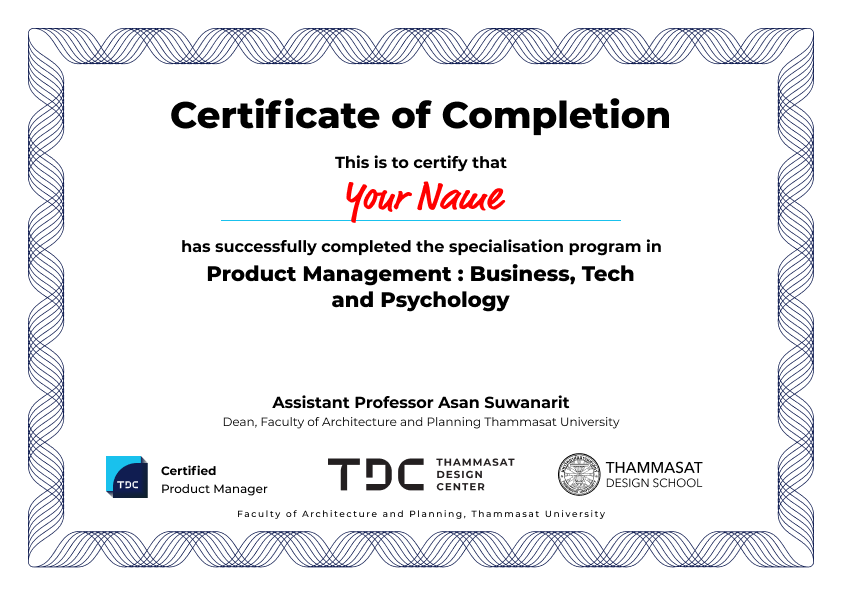
Ready to become a
Tech Product Manager?

Learning Paths Available
save 50% on tuition fee
Course Alumni


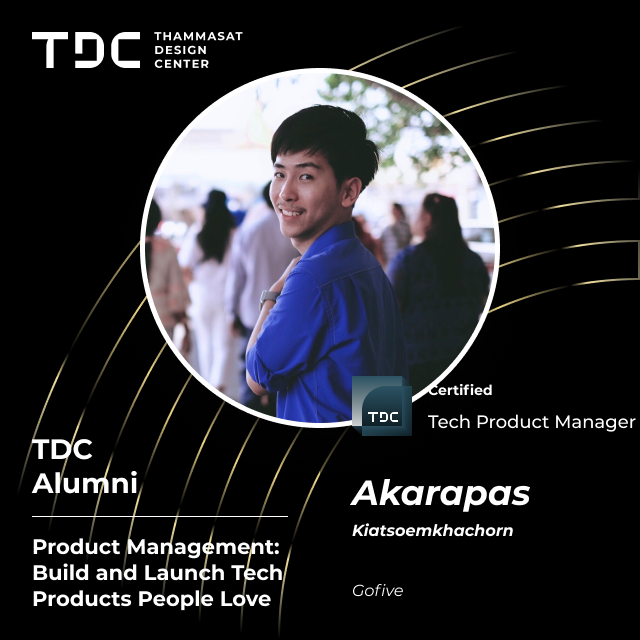
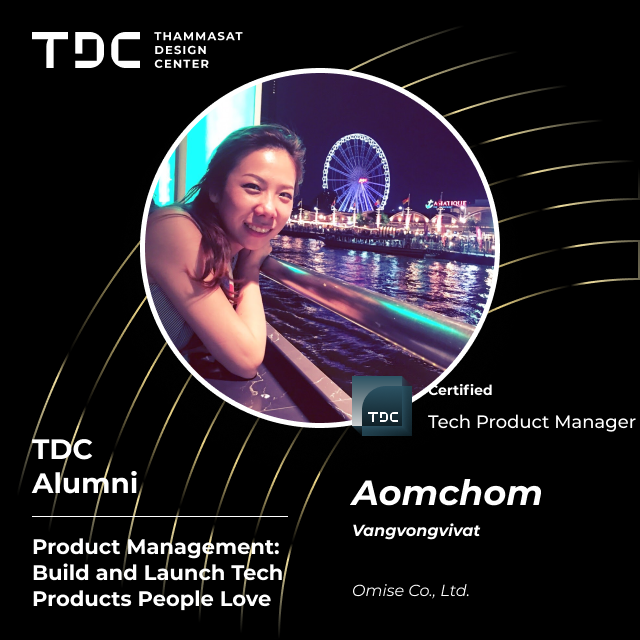
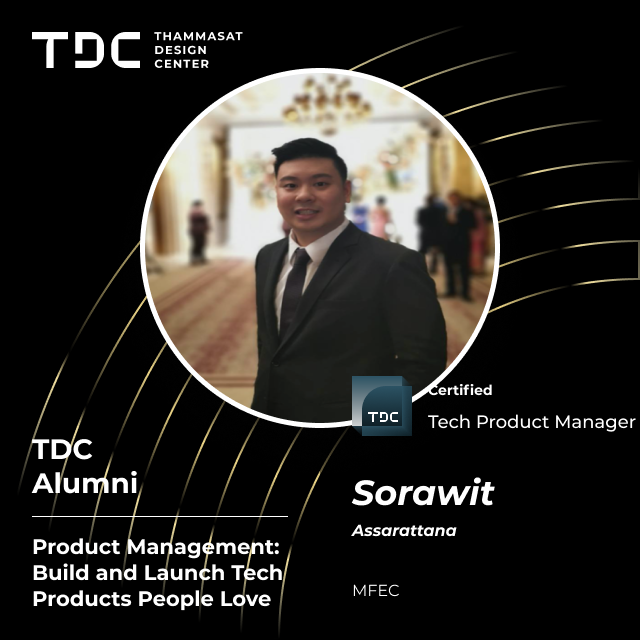


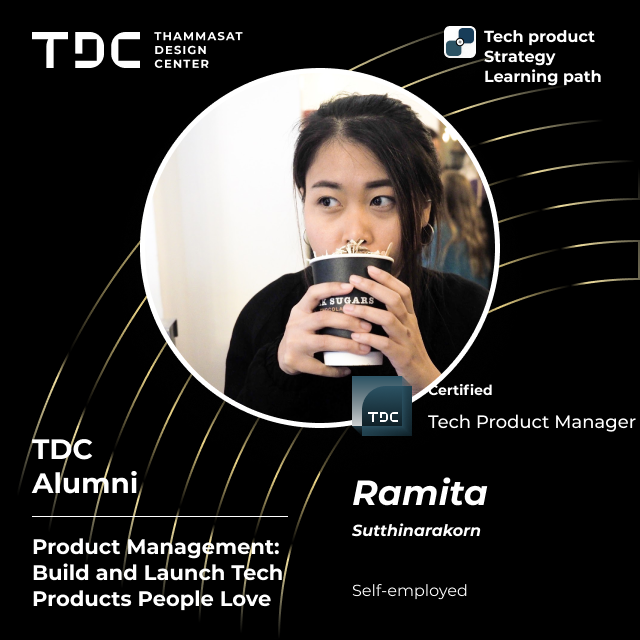
Confirmed Participants
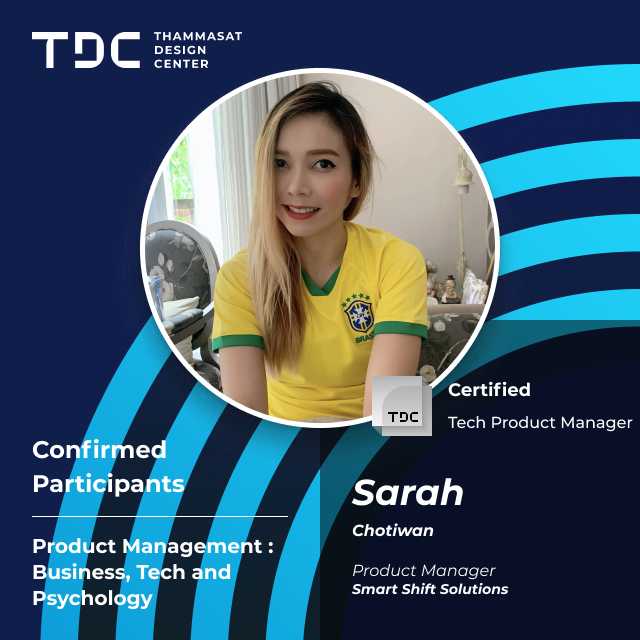
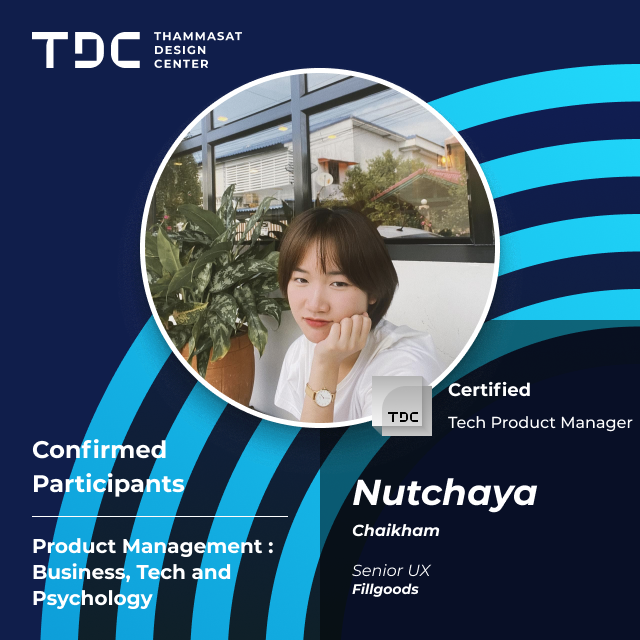
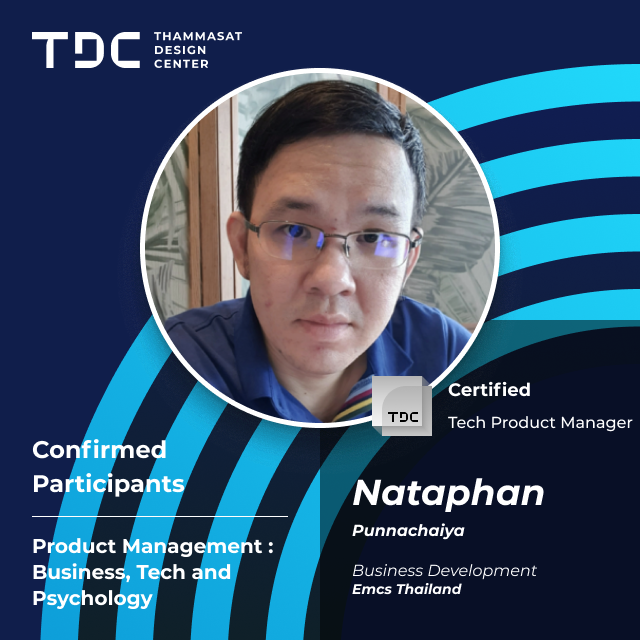
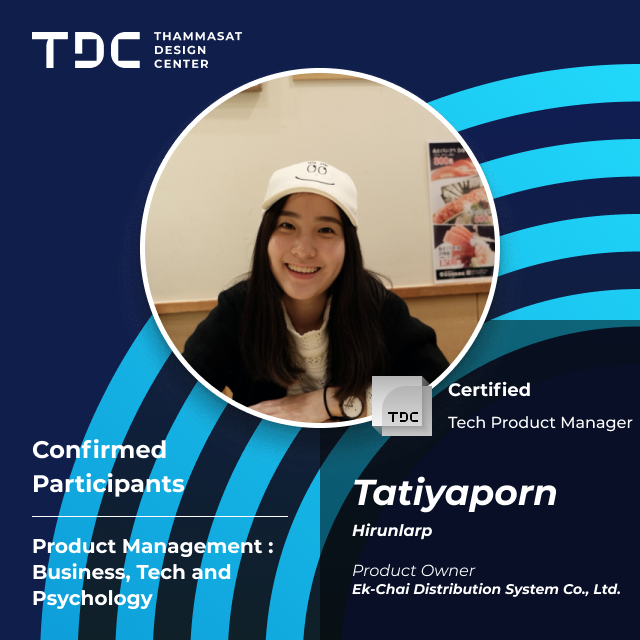
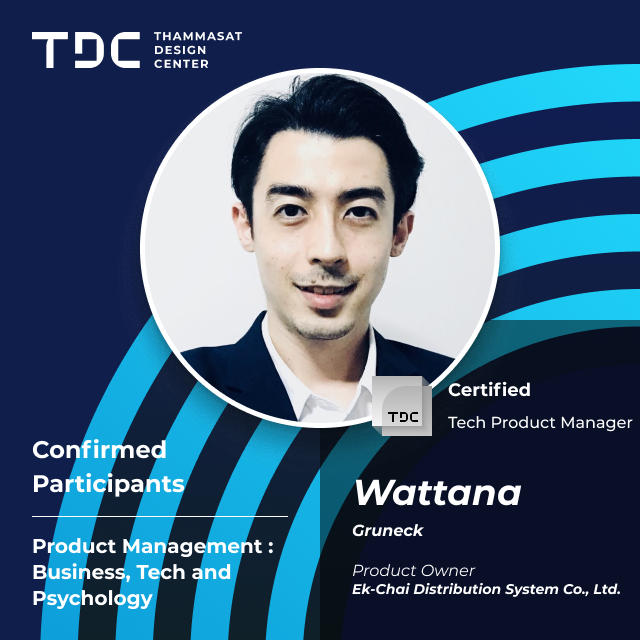
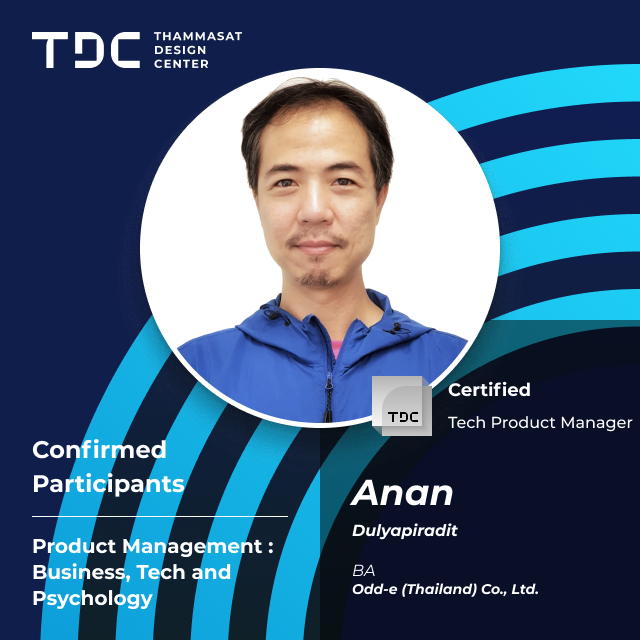
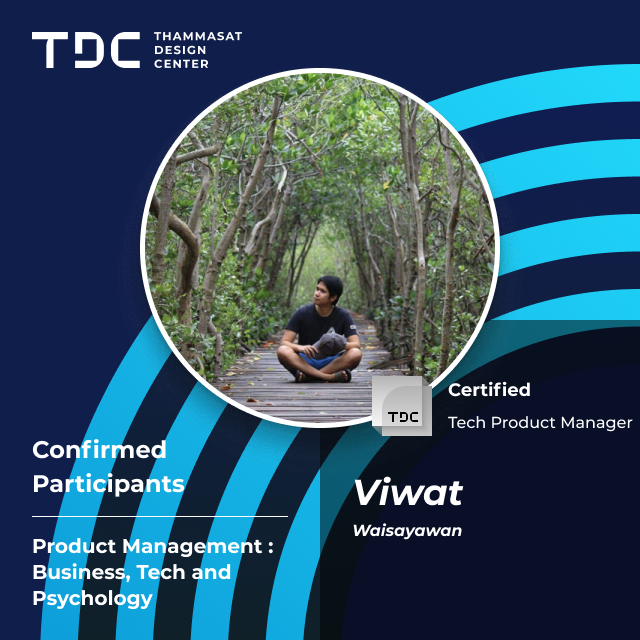
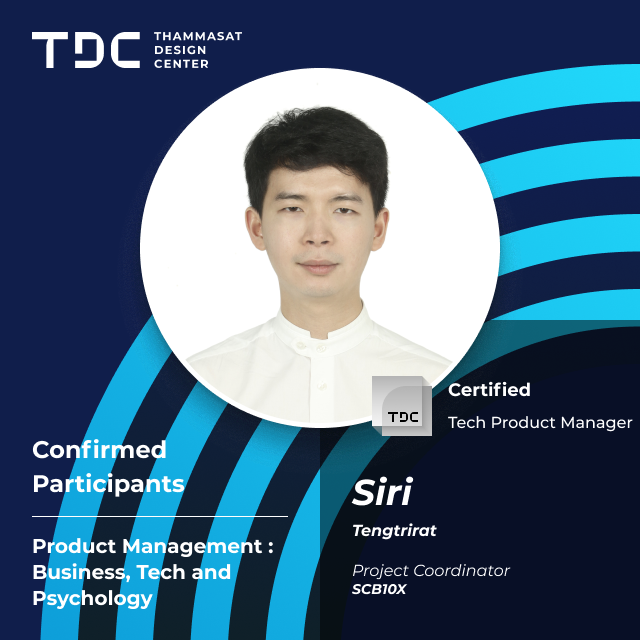
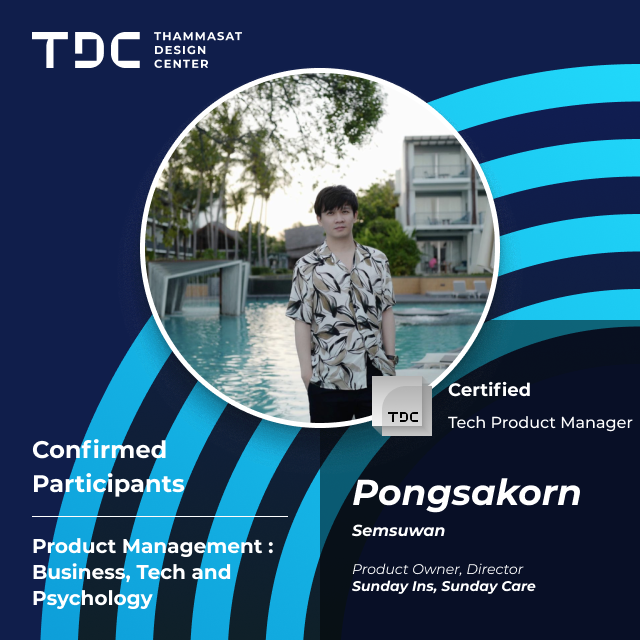
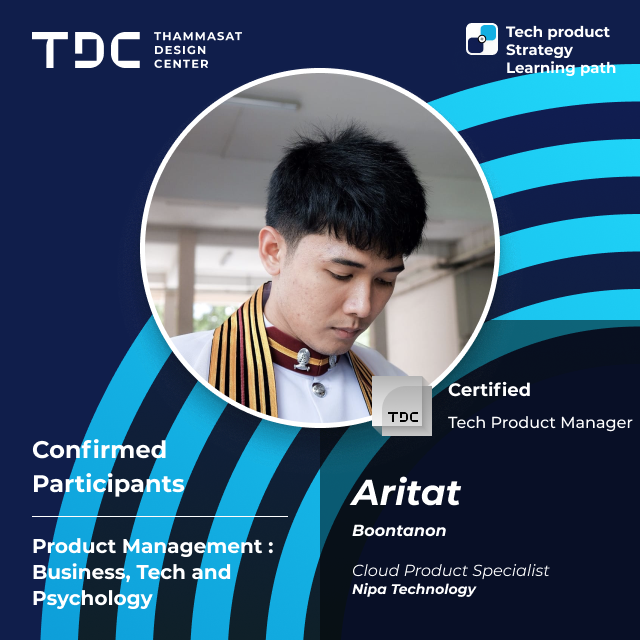
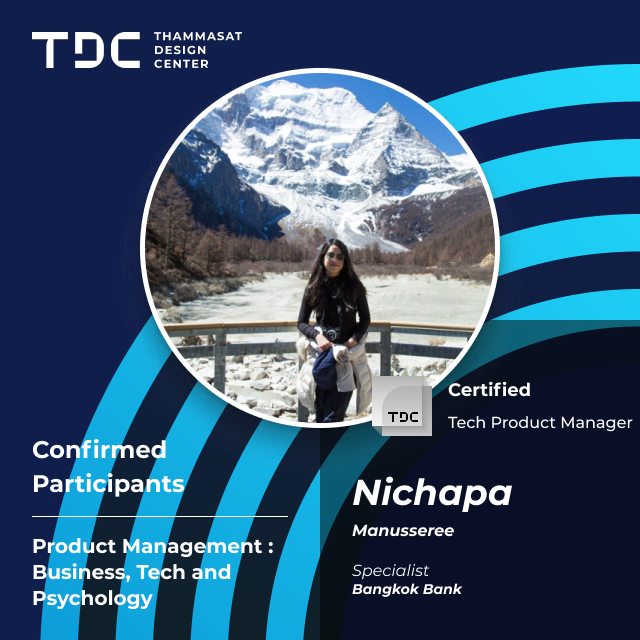
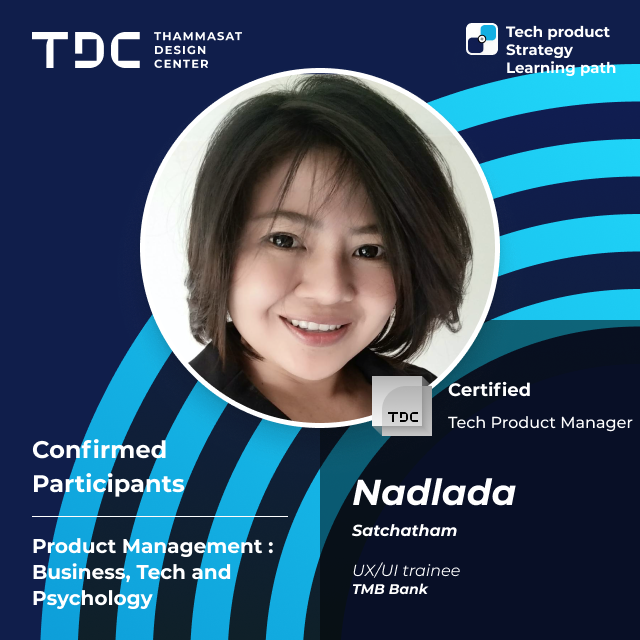
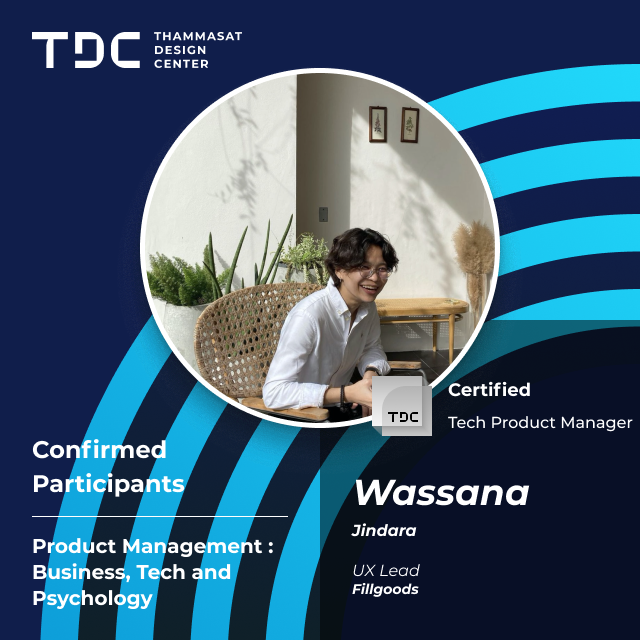
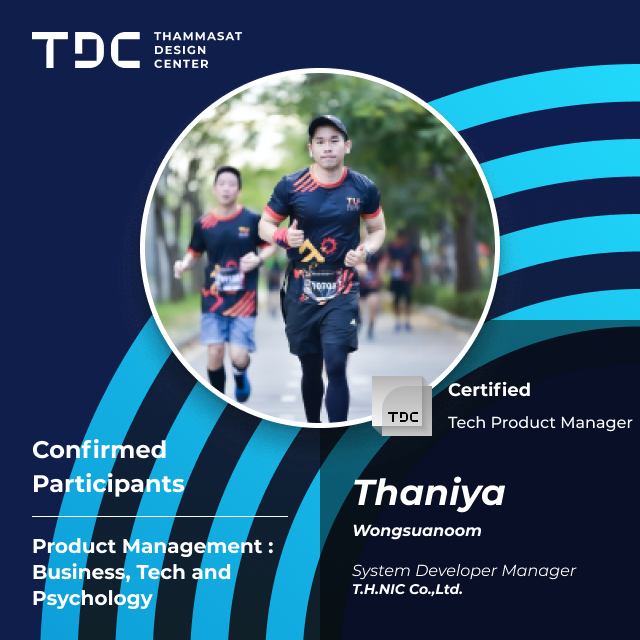
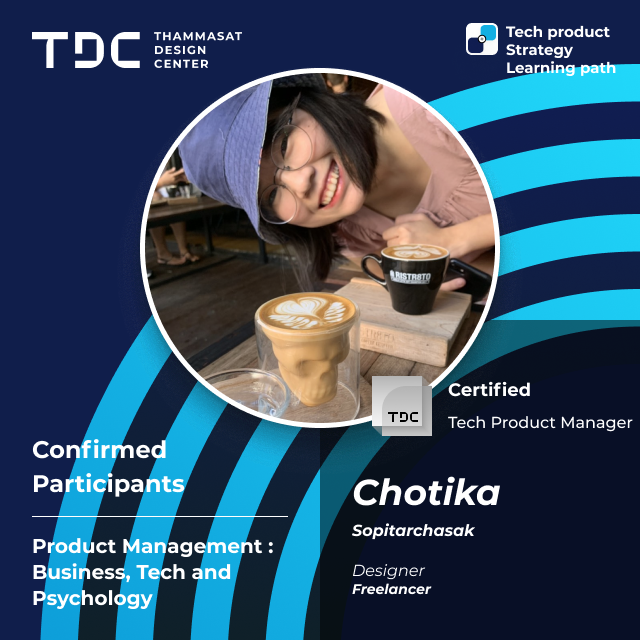
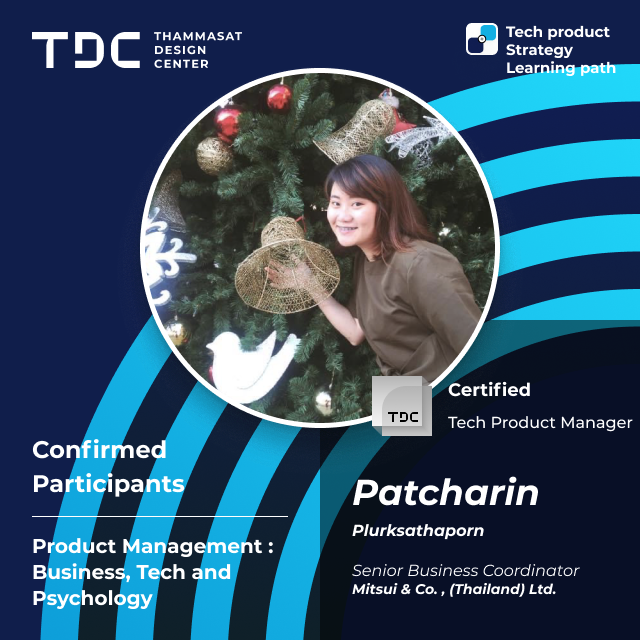
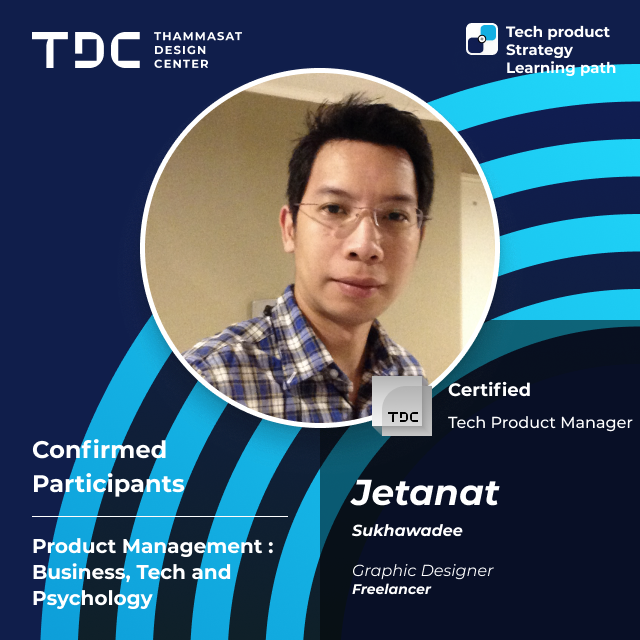
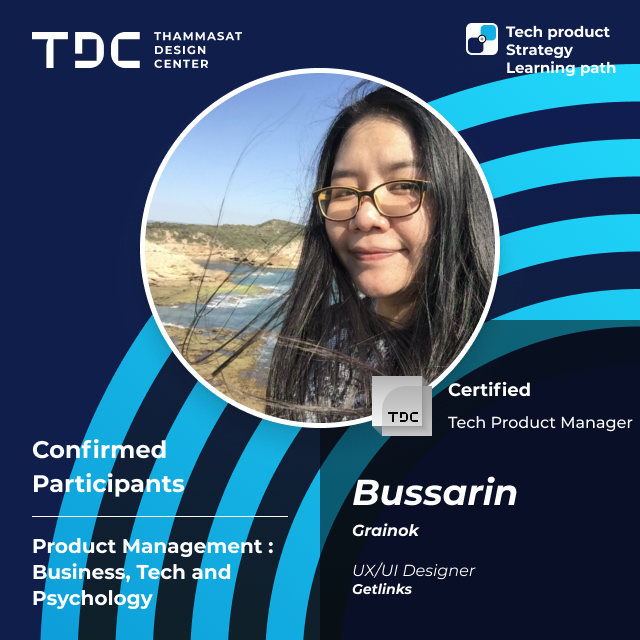
FAQ
A product manager does whatever it takes for the product to succeed. Typically, the responsibilities include: crafting product strategy, understanding and communicating user needs, defining what success means with accompanying metrics to track progress, identifying risks and validating hypotheses to reduce risks, aligning stakeholders, scoping product features for right market segments, creating and communicating product roadmap regarding creating, modifying, removing product features; facilitating design according to product strategy, planning for and driving integration of features with existing business operations, facilitating engineering work (software, hardware, data, AI, etc.) to plan and deliver features according to product strategy, securing budget and resources, managing available resources, putting the right people to the right tasks in the right time, motivating team members, unblocking issues, partnering with appropriate external entities, planning for product marketing, facilitating for the right monetization model and pricing, adjusting these over time, overseeing product releases/launch, optimizing product performance with experimentations, planning responses to competitive moves in the market, planning for synergy with other products in the company’s portfolio, etc.
This course covers the foundation of product management and is designed to accelerate the successful placement in the PM role for those who are new to product management. If you already have some experience in product management, chances are that you are familiar with more than half of the topics in the course. Yet, many previous students who were already product managers when they attended this course say that they came to realize more numerous and deeper connections among these topics, to understand how these topics fit together end-to-end, and to see the same product features or issues in a more discerning light and from new perspectives, resulting in more confidence, wiser decisions, more persuasive communications, and consequently higher performance as a product manager. Some old students who already were product managers also found many topics in this course still new to them, as product management is a vast, deep, and ever-changing discipline. Please reach out to the instructor for a friendly chat to share your background and see where you might fit if you take the course, so you can evaluate if it would be a wise use of your time — the most precious thing a PM manages. Product management is also a community, so even if you end up not taking this course, we are happy to connect you with the community of product managers that we are building.
While UX is a very fun and rewarding discipline, it represents only one of many pillars to product success. Having a knack for design is a great gift, something that most people don’t have. By building on and rounding out your design talent with connections to other disciplines in Product Management such as strategic management, marketing strategy, and tech engineering management, you enrich your life and career whether or not you choose to stay in UX or to become a product manager. If you choose to stay in UX, you will find working with the business and engineering sides easier, as you can influence product direction to serve the user’s needs you have discovered with the design you believe in more effectively. If one day you choose to become a product manager, your transition will be much easier, and you will know better which of the many newly opened possibilities you want to pursue for your career future.
Understanding why users want — and do not want — to do something is the foundation of product management. Products and services can be viewed as additions in our lives that help enable, empower, amplify, modify, preclude, prevent, restraint, simplify, expedite, slow down, facilitate — and otherwise alter — our behaviors. If you zoom out and look at people’s lives and the products in them from afar, you might find that we humans behave in fascinating ways. Some of our behaviors make sense rationally, and some don’t seem logical yet are relatable with something deeper in us. Understanding these motivations is essential for all strategic aims in product management: user acquisition, activation, engagement, retention, monetization, and referral. Behavioural Product Management is an integration of these psychological underpinnings with the other disciplines in product management to make products more successful. Psychology is such an important aspect of product design that it is at the heart of all our courses at TDC. If you want to specialise in it, we are offering you two different tracks: user engagement and digital well-being. If you are looking at ways to engage your customers, create habit-forming technology and loyalty, track 1 is for you. If you are managing a product aimed at changing people’s behaviour (productivity, mental health, fitness etc.) track 2 is for you.


